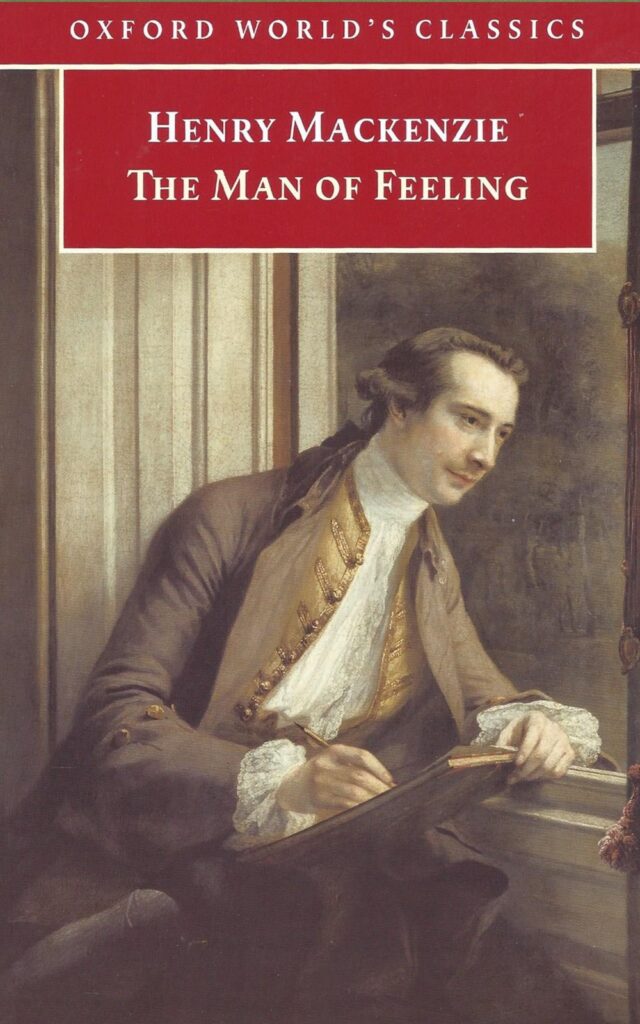The following bibliography comprises a complete list of my Books (B), Articles (A), which are below, and Reviews (R) from 1967 to the present. There is also available a more detailed list of Selected Works, with excerpts from reviews.
| 1968 | A1 | “King Lear and Renaissance Paradoxes”, Modern Language Review, 63: 305–14. |
| A2 | “Swift and the Baconian Idol”, in The World of Jonathan Swift, ed. B. Vickers (B5), pp. 87–128. | |
| A3 | “The Satirical Structure of Gullivers’s Travels and More’s Utopia” (ibid.), pp. 233–57. German tr. in Der utopische Roman ed. R. Villgradter and F. Krey (Darmstadt: Wissenschaftliche Buchgesellschaft, 1973), pp. 126–60. |
|
| 1970 | A4 | Revised Bibliography in Boris Ford (ed.), The Pelican Guide to English Literature, Vol. 2, The Age of Shakespeare. |
| 1971 | A5 | “Shakespeare’s Use of Rhetoric”, in A New Companion to Shakespeare Studies, ed. K. Muir and S. Schoenbaum (Cambridge: Cambridge University Press), pp. 83–98. German tr. in Shakespeare. Eine Einführung (Stuttgart: Reclam, 1972), pp. 85–101. |
| A6 | “Bacon’s Use of Theatrical Imagery”, Studies in the Literary Imagination, 4: 189–226. | |
| 1972 | A7 | “The Songs and Sonnets and the Rhetoric of Hyperbole”, in John Donne: Essays in Celebration, ed. A. J. Smith (London: Methuen), pp. 132–74. |
| 1973 | A8 | Article Rhetoric and entries (definitions, illustrations) for all the figures of rhetoric in Cassell’s Encyclopedia of World Literature, second edition in 3 vols., General Editor J. Buchanan-Brown (London: Cassell). |
| 1974 | A9 | “Die ersten Shakespeare-Kritiker”; Annual Shakespeare Lecture of the Deutsche Shakespeare-Gesellschaft West, delivered in Zürich 21 April 1974; abridged text, Neue Zürcher Zeitung 1 Sept., p. 51; full text in Deutsche Shakespeare-Gesellschaft West: Jahrbuch 1975, pp. 10–30. |
| 1977 | A10 | “Teaching Coriolanus: the importance of perspective”, in Teaching Shakespeare ed. W.Edens (Princeton: Princeton University Press), pp. 228–70. |
| 1978 | A11 | “Steevens as a reporter of Johnson”, Notes and Queries, 25: 58–9. |
| 1979 | A12 | “Frances Yates and the Writing of History”, Journal of Modern History, 51: 287–316. |
| A13 | “Shakespeare’s Hypocrites”, Daedalus 108: 45–83. (Summer 1979 issue of the Proceedings of the American Academy of Arts and Sciences, on “Hypocrisy, Illusion, and Evasion”). | |
| 1980 | A14 | “Authority and Coercion in Elizabethan Thought”, review essay of W. Speed Hill (General Editor), The Folger Edition of the Works of Richard Hooker, Queen’s Quarterly, 87: 114–23. |
| 1981 | A15 | “The Emergence of Character Criticism, 1774–1800”, Shakespeare Survey, 34: 11–21. |
| A16 | “Rhetorical and anti-rhetorical tropes: On writing the history of elocutio”, Comparative Criticism, 3: 105–32. |
|
| A17 | “A Bibliography of Rhetoric Studies, 1970–1980”, Comparative Criticism, 3: 316–22. | |
| 1982 | A18 | Foreword to Muriel Bradbrook, Artist and Society in Shakespeare’s England (Brighton: Harvester), pp. vii–x. |
| A19 | “On the Practicalities of Renaissance Rhetoric”, in Rhetoric Revalued, ed. B. Vickers (B18), pp. 133–41. | |
| A20 | “Territorial Disputes: Philosophy versus Rhetoric”, ibid., pp. 247–66. | |
| 1983 | A21 | “Renaissance Studies in English Universities”, Bulletin of the Society for Renaissance Studies, 1: 2–11. |
| A22 | “ ‘The power of persuasion’: images of the orator, Elyot to Shakespeare”, in Renaissance Eloquence. Studies in the Theory and Practice of Renaissance Rhetoric, ed. J. J. Murphy (Berkeley, Los Angeles and London: University of California Press), pp. 411–35. Spanish translation, La Elocuencia en el Renacimiento, by G. G. Bernal et al. (Madrid: Visor, 1999). | |
| A23 | “Epideictic and Epic in the Renaissance”, New Literary History, 14: 497–537. | |
| A24 | “Epideictic Rhetoric in Galileo’s Dialogo”, Annali dell’ Istituto e Museo di Storia delle Scienze di Firenze, 8: 69–102. | |
| 1984 | A25 | “Analogy versus identity: the rejection of occult symbolism, 1580–1680”, in Occult and Scientific Mentalities in the Renaissance, ed. B. Vickers (B19), pp. 95–163. |
| A26 | “Steevens or Whalley? A question of authorship”, Shakespeare Quarterly, 35: 196–201. | |
| A27 | “Figures of rhetoric / figures of music?”, Rhetorica, 2: 1–44. | |
| A28 | Revised Bibliography for “The Age of Shakespeare” in The New Pelican Guide to English Literature, Vol. 2, The Age of Shakespeare, ed. Boris Ford, pp. 101–91. | |
| A29 | “Rhetoric and Feeling in Shakespeare’s Sonnets”, in Shakespeare Today: Directions and Methods of Research, ed. Keir Elam (Florence: La Casa Usher), pp. 53–98. | |
| A30 | “Bacon’s so-called ‘Utilitarianism’: sources and influence”, in Francis Bacon. Terminologia e Fortuna nel XVII Secolo, ed. Marta Fattori (Rome: Edizioni dell’Ateneo), pp. 281–313. |
|
| A31 | “The Age of Eloquence”, review essay of Marc Fumaroli, L’Age de l’Eloquence, History of European Ideas 5: 427–37. | |
| 1985 | A32 | “Donne’s Eagle and Dove”, Notes and Queries 32: 59–60. |
| A33 | “Shakespeare’s Prose”, in William Shakespeare. His World, His Work, His Influence, ed. John Andrews, 3 vols. (New York: Scribner), Vol.2, pp. 389–95. | |
| A34 | “The Royal Society and English Prose Style: A Reassessment”, in Rhetoric and the Pursuit of Truth: Language Change in the Seventeenth and Eighteenth Centuries (Los Angeles: The William Andrews Clark Memorial Library), pp. 1–76. |
|
| A35 | “Public and Private Life in Seventeenth-Century England: The Mackenzie-Evelyn Debate”, in Arbeit, Musse, Meditation. Betrachtungen zur Vita activa und Vita contemplativa, ed. B. Vickers (B20), pp. 257–78. | |
| 1986 | A36 | “Valla’s ambivalent praise of pleasure: rhetoric in the service of Christianity”, Viator 17: 271–319. |
| A37 | “Rites of Passage in Shakespeare’s Prose”, Deutsche Shakespeare-Gesellschaft West: Jahrbuch 1986, pp. 45–76. | |
| 1987 | A38 | “The Seventeenth Century”, in The Oxford Illustrated History of English Literature, ed. J. P. W. Rogers (Oxford: Oxford University Press), pp. 159–213. Paperback edn. 2001. |
| A5a | “Shakespeare’s Use of Rhetoric”, in A Reader in the Language of Shakespearean Drama, ed. V. Salmon and E. Burness (Amsterdam and Philadelphia: John Benjamins), pp. 391–406. | |
| 1988 | A39 | “Kritische Reaktionen auf die okkulten Wissenschaften in der Renaissance”, in Zwischen Wahn, Glaube und Wissenschaft. Magie, Astrologie, Alchemie und Wissenschaftsgeschichte, ed. J.-F. Bergier (Zürich: Verlag der Fachvereine), pp. 167–239 (A62, tr. M. Soland). |
| A40 | “On the function of analogy in occult science”, in Hermeticism and the Renaissance, ed. I. Merkel and A. G. Debus (Cranbury, NJ: Associated University Presses), pp. 269–92. | |
| A41 | “The Atrophy of Rhetoric, Vico to de Man”, Rhetorica 6: 21–56. | |
| A42 | “Rhetoric and Poetics”, in The Cambridge History of Renaissance Philosophy, ed. C. B. Schmitt and Q. Skinner (Cambridge: Cambridge University Press), pp. 715–45. | |
| A43 | “Shakespearian Adaptations and the Tyranny of the Audience”, in Das Shakespeare-Bild in Europa zwischen Aufklärung und Romantik, ed. Roger Bauer (Bern: Peter Lang), pp. 37–59. | |
| A44 | “Prose without Rhetoric?”, Review essay of Janel M. Mueller, The Native Tongue and the Word: Developments in English Prose Style 1380–1580, English Language Notes 26: 65–85. |
|
| 1989 | A45 | “Rhetorik und Philosophie in der Renaissance”, tr. M. Soland, in Rhetorik und Philosophie, ed. H. Schanze and J. Kopperschmidt (Munich: Wilhelm Fink), pp. 121–57. |
| A46 | “Machiavelli and Marvell’s Horatian Ode”, Notes and Queries 36: 32–8. | |
| A47 | “Classicism”, in International Encyclopedia of Communications, ed. Erik Barnouw et al. (New York and Oxford: Oxford University Press), Vol. 1, pp. 287–92. | |
| A48 | “The Idea of Exchange in The Merchant of Venice”, in L’image de Venise au temps de la Renaissance, ed. M. T. Jones-Davies (Paris: Touzot), pp. 17–49. | |
| 1990 | A49 | “The Dangers of Dichotomy”, Journal of the History of Ideas 51: 148–59. |
| A50 | “Leisure and idleness in the Renaissance: the ambivalence of otium”, Renaissance Studies 4 / No. 1: 1–37; and 4 / No. 2: 107-54. |
|
| A51 | “The Recovery of Rhetoric: Petrarch, Erasmus, Perelman”, History of the Human Sciences 3: 415–41; repr. in The Recovery of Rhetoric. Persuasive Discourse and Disciplinarity in the Human Sciences, ed. R. H. Roberts and J. M. M. Good (Bristol, 1993), pp. 25–48. | |
| A52 | “Bacon’s Use of Theatrical Imagery”, in Francis Bacon’s Legacy of Texts, ed. W. A. Sessions (New York: AMS), pp. 171–213; revised version of A6. | |
| A53 | “The Discrepancy between res and verba in Greek Alchemy”, in Alchemy Revisited, ed. Z. R. W. M. von Martels (Leiden: Brill), pp. 21–33. | |
| 1991 | A54 | “Bacon among the literati: science and language”, Comparative Criticism 13: 249–71. |
| A55 | “A scholarly tradition continued”. Essay review of John Henry and Sarah Hutton (eds.), New Perspectives on Renaissance Thought: Essays in the History of Science, Education and Philosophy in Memory of Charles B. Schmitt, British Journal for the History of Science 24: 243–51. | |
| A56 | “Francis Bacon”, in The Blackwell Companion to the Enlightenment, ed. John W. Yolton et al. (Oxford: Basil Blackwell), pp. 50–2. | |
| A57 | “On the goal of the occult sciences in the Renaissance”, in Die Renaissance im Blick der Nationen Europas, ed. Georg Kauffmann (Wiesbaden: Harrassowitz), pp. 51–93. | |
| 1992 | A58 | “Rhetoric and Functionality in Hopkins”, in The Authentic Cadence: Centennial Essays on Gerard Manley Hopkins, ed. Anthony Mortimer (Fribourg: Fribourg University Press), pp. 73–141. |
| A59 | “Pour une véritable histoire de l’éloquence”, Etudes littéraires 24: 121–52 (enlarged version of A16, tr. S. Vouvé and M. Soland). | |
| A60 | “Francis Bacon and the Progress of Knowledge”, Journal of the History of Ideas 53: 495–518. | |
| A61 | “Alchemie als verbale Kunst: die Anfänge”, in Chemie und Geisteswissenschaften, ed. J. Mittelstrass and G. Stock (Berlin: Akademie Verlag), pp. 17–34 (A53, tr. M. Soland / S. Köllmann). | |
| A62 | “Critical Reactions to the Occult Sciences During the Renaissance”, in The Scientific Enterprise, ed. Edna Ullmann-Margalit (Dordrecht: Kluwer Academic Publishers), pp. 43–92. | |
| 1993 | A63 | “Utopia and Plutarch’s Moralia”, Notes and Queries 40: 152. |
| A64 | Revised Bibliography in Boris Ford (ed.) The New Pelican Guide to English Literature, Vol. 2, The Age of Shakespeare, pp. 499–580. | |
| A65 | “Rhetoric in Seventeenth-Century English Poetry”, in The Cambridge Companion to English Poetry: Donne to Marvell, ed. Thomas N. Corns (Cambridge: Cambridge University Press), pp. 101–20. | |
| A66 | “Shakespearian Consolations” [Open Access], Proceedings of the British Academy 82: 219–84 (British Academy, Annual Shakespeare Lecture for 1992). | |
| 1994 | A67 | “Some Reflections on the Rhetoric Textbook”, in Renaissance Rhetoric, ed. Peter Mack (London: Macmillan), pp. 81–102. |
| A68 | “Nietzsche im Zerrspiegel de Mans: Rhetorik gegen die Rhetorik”, in Nietzsche oder “Die Sprache ist Rhetorik”, ed. Josef Kopperschmidt and Helmut Schanze (Munich), pp. 219–40 (tr. Andrea Grün-Oesterreich). | |
| A69 | “De Man’s Schismatizing of Rhetoric”, in S. IJsseling and G. Vervaecke (eds.), Renaissances Of Rhetoric (Leuven: Leuven University Press), pp. 193–247. | |
| A70 | “Repetition and Emphasis in Rhetoric: Theory and Practice”, in Andreas Fischer (ed.), Repetition (Tübingen: Gunter Narr Verlag). | |
| A71 | “Reply to a Critic”, Mnemosyne 47: 521–5. | |
| 1995 | A72 | “Deconstruction’s Designs on Rhetoric”, in Rhetoric and Pedagogy. Its History, Philosophy, and Practice. Essays in Honor of James J. Murphy, ed. W. B. Horner and M. Leff (Mahwah, NJ: Erlbaum), pp. 295–315. |
| 1996 | A73 | “Whose thumbprints? A more plausible author for A Funeral Elegy”, TLS, 8 March, pp. 16–18. |
| A74 | “Bacon and rhetoric”, in The Cambridge Companion to Bacon, ed. Markku Peltonen (Cambridge: Cambridge University Press), pp. 200–31. | |
| 1997 | A75 | “The Authenticity of Bacon’s Earliest Writings”, Studies in Philology 94: 248–96. |
| A76 | “Public and Private Rhetoric in Hooker’s Lawes”, in Richard Hooker and the Construction of Christian Community, ed. Arthur Stephen McGrade (Tempe, AZ: Medieval and Renaissance Texts and Studies), pp. 95–145. |
|
| A77 | “Derrida’s reading of C. S. Peirce”, Letter to the Editor, TLS, 9 May, p. 15. | |
| A78 | “‘Suppose you see’: The Chorus in Henry V, and The Mirror for Magistrates”, in Shakespearean Continuities, Essays in Honour of E. A. J. Honigmann, ed. John Batchelor, Tom Cain and Claire Lamont (London: Macmillan), pp. 74–90. | |
| 1999 | A79 | “Samuel Hartlib and the ‘Office of Address’ (1648)”, in 1648/1998 – 350 Jahre nach dem Westfälischen Frieden, ed. J. -F. Bergier (Zürich: Verlag der Fachvereine), pp. 29–48. |
| A80 | “Antony’s ‘Gaudy Night’ and the sack of Troy”, Notes and Queries 244: 240–1. | |
| A81 | “On editing Bacon’s Essays, again”, Compass 3 (Oxford University Press), pp. 13–15. | |
| A82 | “Humanismus und Kunsttheorie in der Renaissance”, in Theorie der Praxis. Leon Battista Alberti als Humanist und Theoretiker der bildenden Künste, herausgegeben von Kurt W. Forster u. Hubert Locher (Berlin: Akademie Verlag), pp. 9–74; tr. H. Locher. | |
| A83 | “Language made new: Romeo and Juliet”, in Angelo Righetti (ed.), Rileggere / Re-reading “Romeo and Juliet” (Verona: Università degli studi di Verona), pp. 19–44. | |
| 2000 | A84 | “The myth of Francis Bacon’s ‘anti-humanism’”, in Jill Kraye and M. W. F. Stone (eds.), Humanism and Early Modern Philosophy (London: Routledge), pp. 135–58. |
| A85 | “Looking for the Rhetoric of Science”. Essay review of Henry Krips, J. E. McGuire, and Trevor Melia (editors), Science, Reason, and Rhetoric, Annals of Science 57: 441–6. | |
| 2001 | A86 | [with David J. Lake] “Scribal copy for Q1 of Othello: A Reconsideration”, Notes and Queries 246: 284–7. |
| A87 | “The Idea of the Renaissance, revisited”, SEDERI XII (Valladolid: Sociedad Española de Estudios Renacentistas Ingleses), pp. 69–95. | |
| A88 | “Rhetoric and Philosophy”, in T. Sloane (ed.), The Oxford Encyclopedia of Rhetoric (New York: Oxford University Press), pp. 583–92. | |
| 2002 | A89 | “‘Words and Things’ – or ‘Words, Concepts, and Things’ Rhetorical and Linguistic Categories in the Renaissance”, in E. Kessler and I. Maclean (eds.), Res et Verba in der Renaissance, (Wiesbaden: Harrassowitz), pp. 287–335. |
| 2003 | A90 | “A rum ‘do’. The likely authorship of ‘A Lover’s Complaint’”, TLS, 5 December, pp. 13–15. |
| 2004 | A91 | “Donald Foster and the Anti-Stratfordians”, Letter to the Editor, TLS, 16 January, p. 15. |
| A92 | “‘Neither Proper nor Useful’: Jesuit Orthodoxy and Galiliean Science”. Essay review of Mordechai Feingold (ed.), The New Science and Jesuit Science: Seventeenth-Century Perspectives, Annals of Science 61: 213–18. |
|
| A93 | “Bacon for our time”. Essay review of The Oxford Francis Bacon, Vol. IV, The Advancement of Learning, ed. Michael Kiernan; Vol. XIII, The ‘Instauratio Magna’: Last Writings, ed. Graham Rees, Early Science and Medicine 9: 144–62. | |
| A94 | “The Troublesome Raigne, George Peele, and the date of King John”, in Brian Boyd (ed.), Words that Count: Early Modern Authorship: Essays in Honor of MacDonald P. Jackson (Newark, NJ: Associated University Presses), pp. 78–118. | |
| A95 | “A John Davies ‘Ghost’”, Notes and Queries 249: 370. | |
| 2005 | A96 | “Thomas Thorpe and the Oxford DNB”, Letter to the Editor, TLS, 21 January, p. 15. |
| 2007 | A97 | From the Consolatio to Counselling: Grief Therapy, Ancient and Modern, pp. 36 (John Coffin Lecture in Intellectual History, School of Advanced Study, London University). |
| A98 | “Francis Bacon, mirror of each age”, in John L. Heilbron (ed.), Advancements of Learning. Essays in Honour of Paolo Rossi (Firenze: Olschki), pp. 15–57. |
|
| A99 | “Incomplete Shakespeare: Or, Denying Coauthorship in 1 Henry VI”, Shakespeare Quarterly 58: 311–52. | |
| A100 | “The Authentic and Inauthentic Hamlet”, Editionen in der Kritik 2: 15-42 | |
| 2008 | A101 | “Approaching Shakespeare’s late style”, Early Modern Literary Studies 13.3 (January): 6.1-26. |
| A102 | “The ‘New Historiography’ and the Limits of Alchemy”. Essay review of William R. Newman and Lawrence M. Principe (eds.), George Starkey, Alchemical Laboratory Notebooks and Correspondence; William R. Newman, Promethean Ambitions. Alchemy and the Quest to Perfect Nature; Lauren Kassell, Medicine and Magic in Elizabethan London. Simon Forman: Astrologer, Alchemist, and Physician: Annals of Science 65: 127–56. | |
| A103 | “Thomas Kyd, secret sharer”, TLS, 18 April 2008, pp. 13-15. | |
| A104 | “Francis Bacon, Feminist Historiography, and the Dominion of Nature”, Journal of the History of Ideas 69: 117–41. | |
| A105 | “Co-authors and closed minds”, Shakespeare Studies 36: 101–13. | |
| 2009 | A106 | “The Marriage of Philology and Informatics”, British Academy Review 14 (November 2009): 41-4. |
| 2010 | A107 | “Disintegrated. Did Middleton really adapt Macbeth?”, TLS, 28 May 2010, pp. 14–15; letters to the Editor, 11 and 25 June 2010. |
| 2011 | A108 | “Shakespeare and Authorship studies in the Twenty-First Century”, Shakespeare Quarterly 62: 106-42. |
| 2012 | A109 | “Identifying Shakespeare’s Additions to The Spanish Tragedy (1602): a new(er) approach”, Shakespeare 8: 13-43. |
| A110 | “All’s Well that Ends Well — An Attribution Refuted”; with Marcus Dahl, Times Literary Supplement, 11 May 2012; ‘Letters to the Editor’, 8 and 15 June. | |
| 2013 | A111 | “Lear’s fool and the meaning of ‘snatching’”, Notes and Queries 258: 427-9. |
| 2014 | A112 | “Ben Jonson’s Classicism revisited”, The Ben Jonson Journal 21: 153-202. |
| A113 | “At feud with sin”, review of The Cambridge Edition of the Works of Ben Jonson, Times Literary Supplement, 24 January 2014, pp. 3-5. | |
| A114 | “The Two Authors of Edward III”, Shakespeare Survey 67: 69-84. | |
| 2015 | A115 | “A Catalogue of British Drama”, essay-review of Martin Wiggins, British Drama 1533-1642: A Catalogue. Volumes I-III, Spenser Review 45.1.2. |
| A116 | “No Shakespeare to be found”, review of MacDonald P. Jackson, Determining the Shakespeare Canon, Times Literary Supplement, 24 April 2015, pp. 9-11. Letters to the Editor, 8 May, 22 May. | |
| A117 | “Evaluating Collaborators”, essay-review of Jonathan Bate and Eric Rasmussen (eds), William Shakespeare and Others: Collaborative Plays, Archiv für das Studium der neueren Sprachen und Literaturen, 252: 353-65. | |
| 2016 | A118 | “Marlowe in Edward II: Lender or Borrower?”, in Joseph Candido (ed.), The Text, the Play, and the Globe. Essays on Literary Influence in Shakespeare’s World and His Work in Honor of Charles R. Forker (Madison, Teaneck: Fairleigh Dickinson University Press), pp. 43-74. |
| A119 | “An Appropriate Revenge: Medea and Macduff”, Notes and Queries 261/3 (September 2016): 433-4. | |
| 2017 | A120 | “Shakespeare and the 1602 Additions to The Spanish Tragedy: a method vindicated”, Shakespeare 13 (2017): 101-6. |
| A121 | “‘Upstart Crow?’ The Myth of Shakespeare’s Plagiarism”, Review of English Studies 68 (2017): 244-67. | |
| A122 | “Too too solid. Two attempts to collect the complete Shakespeare”, review essay of The Norton Shakespeare, Third Edition and The New Oxford Shakespeare. The Complete Works. Modern Critical Edition, Times Literary Supplement, 21 April 2017, pp. 7-9. |
|
| A123 | “A new source for Sonnet 129”, Notes and Queries 64: 292-4. | |
| 2018 | A124 | “Kyd’s authorship of King Leir”, Studies in Philology 115: 433-71. |
| A125 | “Prufrock and Mary of Argyle”, Notes and Queries 263: 411-12. |
|
| A126 | “Verbal repetition in Arden of Faversham: Shakespeare or Kyd?”, Notes and Queries 263 (December): 498-502. |
|
| A127 | “Authorship attribution and Elizabethan drama: qualitative versus quantitative methods”, Authorship (December). |
|
| A128 | “The ‘Dial Hand’ Epilogue: by Shakespeare, or Dekker?”, Authorship (December). |
|
| 2019 | A129 | “Is EEBO-TCP / LION Suitable for Attribution Studies?”, Early Modern Literary Studies 22:1 (2019). |
| A130 | “Kyd, Edward III, and ‘The Shock of the New’”, ANQ (13 May). |
|
| 2020 | A131 | “Shooting sharp quills in every line: A monument of scholarship in the service of a great poet”, Review of the Variorum Edition of the Poetry of John Donne, TLS, 14 February: 4-6. |
| A132 | “Kyd, Shakespeare, and Arden of Faversham: a (belated) reply to MacDonald Jackson”, Research Opportunities in Medieval and Renaissance Drama 56/57: 105-34. |
|
| A133 | “Infecting the Teller. The Failure of a Mathematical Approach to Shakespeare Studies”, Times Literary Supplement, 17 April 2020, pp. 15-14. | |
| 2021 | A134 | “Dogberry, the Book of Job, and Gabriel Harvey”, Notes and Queries 266:1 (March): 99-100. |
| A135 | “Authorship Candidates for Arden of Faversham: Kyd, Shakespeare, Thomas Watson”, Studies in Philology 118 (Spring): 308-41. |
|
| A136 | “Arden of Faversham, the Authorship Problem: Shakespeare, Watson, or Kyd?”, Digital Studies in the Humanities. | |
| 2022 | A137 | “Thomas Watson, Thomas Kyd, and the re-use of Ovid”, Notes and Queries, 267/2 (2022): 88-9. |
| A138 | “The limitations of stylometry: idiolect and the authorship of Titus Andronicus“, Notes and Queries, 267/3 (2022): 207-11. | |
| 2023 | A139 | “Epistrophe and the ‘lost line’ in The Spanish Tragedy“, Notes and Queries, 268/3: 160-4. |
| A140 | “Compositors’ spelling preferences and the integrity of 2 Henry VI“. Library, 7th series, 24/2: 141-53. | |
| A141 | “Thomas Watson, Thomas Kyd, and Embedded Poetry”, Studies in Philology, 120/3: 557-601. | |
| A142 | “The Spanish Tragedy: Now in Five Acts!”, Notes and Queries, 268/4 (December): 249-50. | |
| 2024 | A143 | “‘Gentle Shakespeare’ and Arden of Faversham: another view”, ANQ. A Quarterly Journal of Short Articles, Notes and Reviews (2024). |
| A144 | “The Compilers of Q1 Hamlet“, Medieval and Renaissance Drama in England, 37 (2024). |



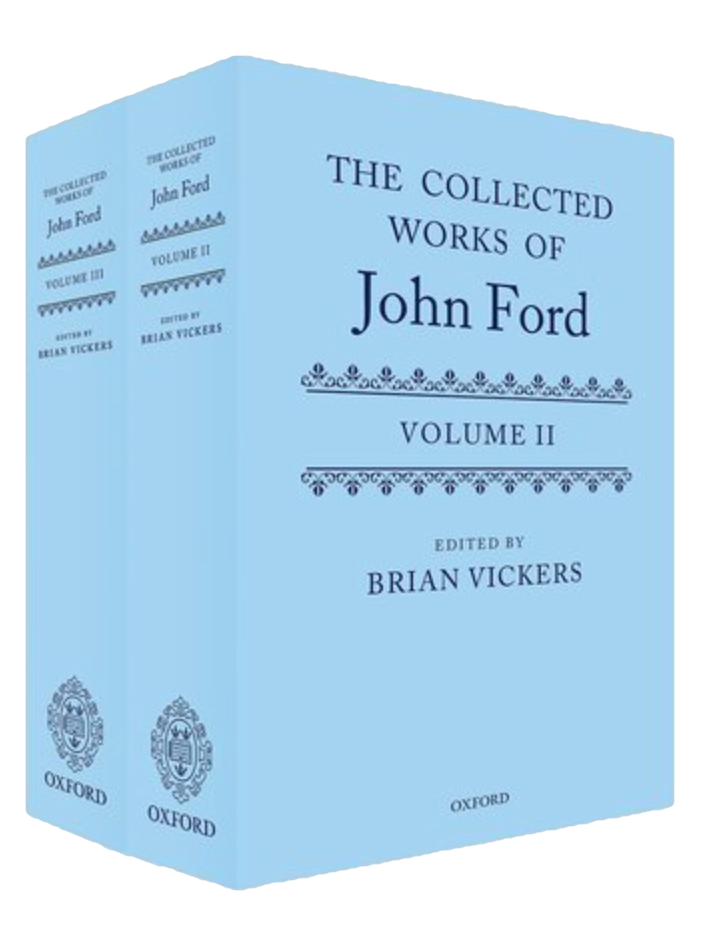 The Complete Works of John Ford, Volume II and III (Oxford: Oxford University Press, 29 September, 2016), pp. 992. ISBN 9780198748878.
The Complete Works of John Ford, Volume II and III (Oxford: Oxford University Press, 29 September, 2016), pp. 992. ISBN 9780198748878. The One King Lear (Cambridge, MA: Harvard University Press, 2016), pp. 410. ISBN 9780674504844.
The One King Lear (Cambridge, MA: Harvard University Press, 2016), pp. 410. ISBN 9780674504844.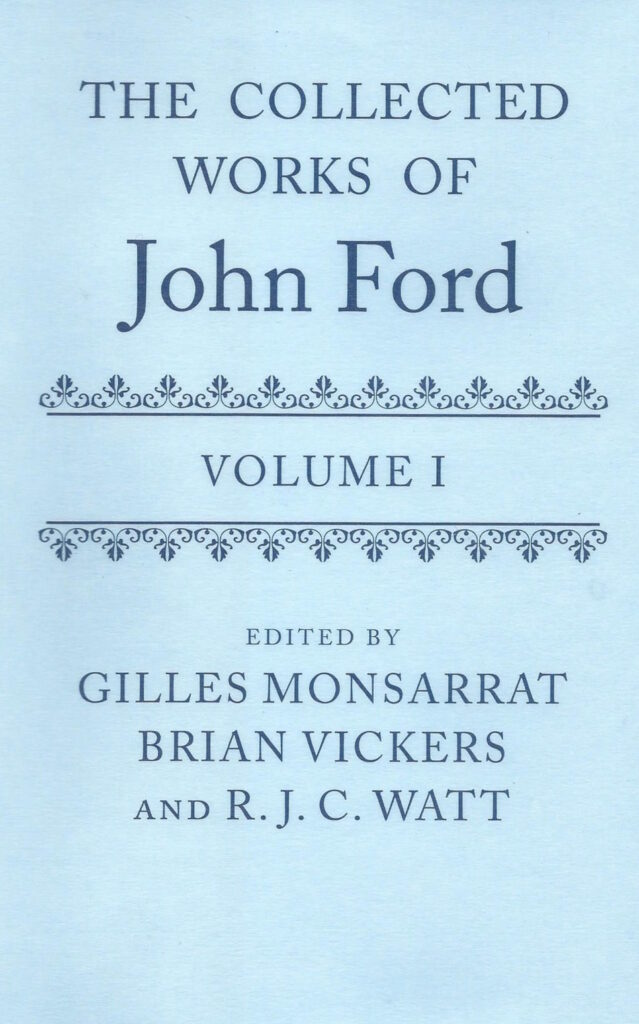 The Collected Works of John Ford, Volume I, edited by Gilles Monsarrat, Brian Vickers, and R. J. C.Watt (Oxford: Oxford University Press, 2012), pp. xiv, 720. ISBN: 978-0-19-959290-6
The Collected Works of John Ford, Volume I, edited by Gilles Monsarrat, Brian Vickers, and R. J. C.Watt (Oxford: Oxford University Press, 2012), pp. xiv, 720. ISBN: 978-0-19-959290-6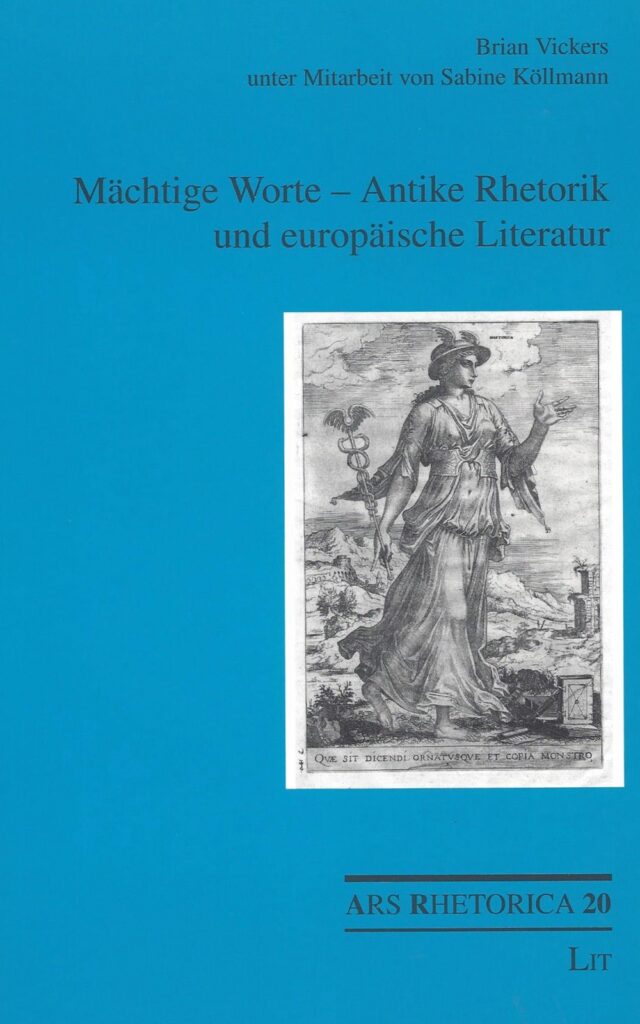 Mächtige Worte. Antike Rhetorik und europäische Literatur, by Brian Vickers and Sabine Köllmann (Berlin: LIT-Verlag, 2008), partial translation of B23, with new material.
Mächtige Worte. Antike Rhetorik und europäische Literatur, by Brian Vickers and Sabine Köllmann (Berlin: LIT-Verlag, 2008), partial translation of B23, with new material.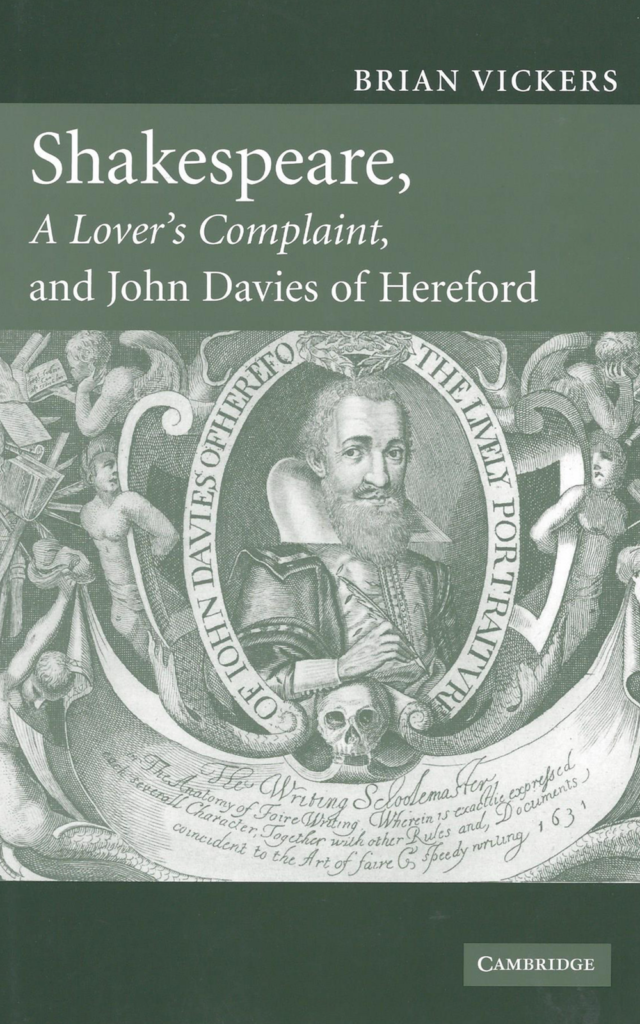 Shakespeare, ‘A Lover’s Complaint’, and John Davies of Hereford (Cambridge: Cambridge University Press, 2007), pp. xii, 329.
Shakespeare, ‘A Lover’s Complaint’, and John Davies of Hereford (Cambridge: Cambridge University Press, 2007), pp. xii, 329. Shakespeare. The Critical Tradition. The Merchant of Venice, ed. by William Baker and Brian Vickers (London and New York; Continuum, 2004), pp. xli, 437. General Editor’s Preface, pp. ix–xli.
Shakespeare. The Critical Tradition. The Merchant of Venice, ed. by William Baker and Brian Vickers (London and New York; Continuum, 2004), pp. xli, 437. General Editor’s Preface, pp. ix–xli. Shakespeare. The Critical Tradition. Coriolanus, 1687–1940, ed. by David George (London and New York; Continuum, 2004), pp. xxvi, 448. General Editor’s Preface, pp. viii–xxiii.
Shakespeare. The Critical Tradition. Coriolanus, 1687–1940, ed. by David George (London and New York; Continuum, 2004), pp. xxvi, 448. General Editor’s Preface, pp. viii–xxiii.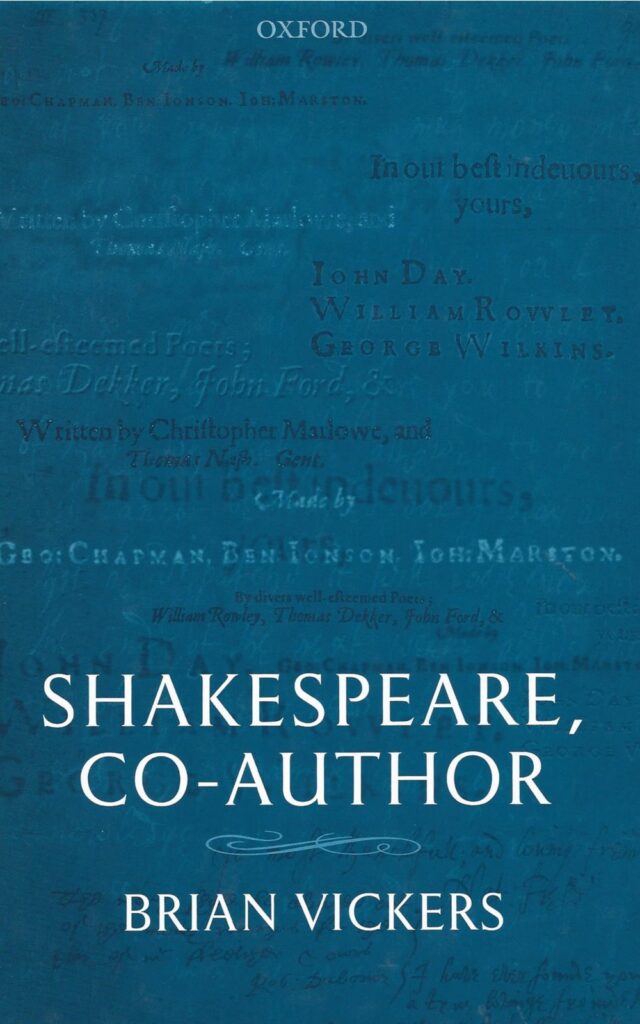 Shakespeare, Co-author. A Historical Study of Five Collaborative Plays (Oxford University Press, 2002), pp. xxix, 561. ISBN: 978-0-19-925653-2.
Shakespeare, Co-author. A Historical Study of Five Collaborative Plays (Oxford University Press, 2002), pp. xxix, 561. ISBN: 978-0-19-925653-2. ‘Counterfeiting’ Shakespeare. Evidence, Authorship, and John Ford’s Funerall Elegye (Cambridge: Cambridge University Press), pp. xxvii, 568.
‘Counterfeiting’ Shakespeare. Evidence, Authorship, and John Ford’s Funerall Elegye (Cambridge: Cambridge University Press), pp. xxvii, 568.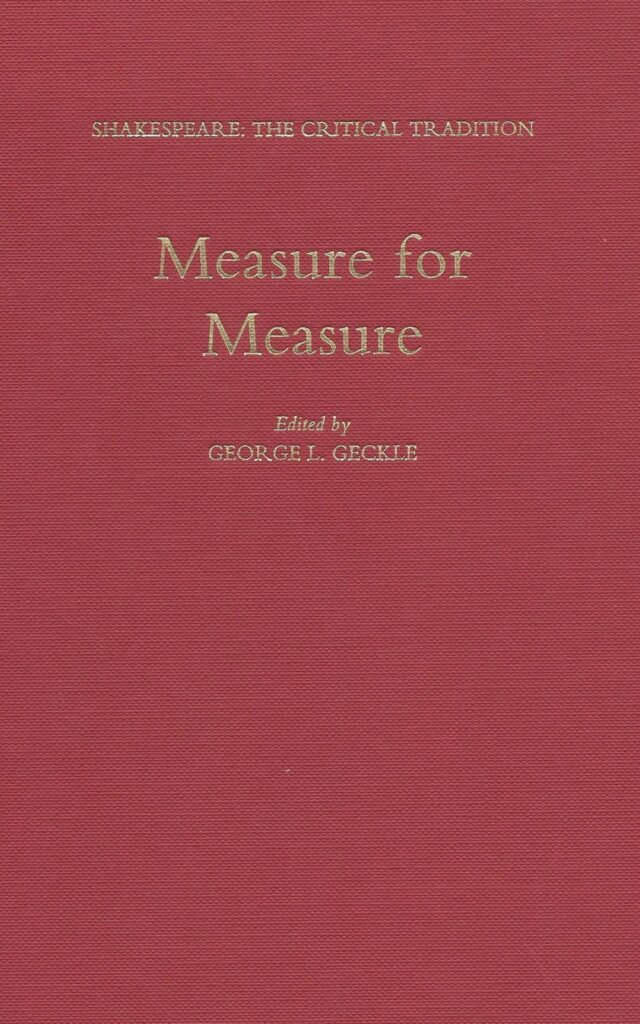 Shakespeare. The Critical Tradition. Measure for Measure, 1783–1920, ed. by George Geckle (London and NJ: Athlone Press, 2001), pp. xxxvi, 382. General Editor’s Preface, pp. x–xxxiv.
Shakespeare. The Critical Tradition. Measure for Measure, 1783–1920, ed. by George Geckle (London and NJ: Athlone Press, 2001), pp. xxxvi, 382. General Editor’s Preface, pp. x–xxxiv.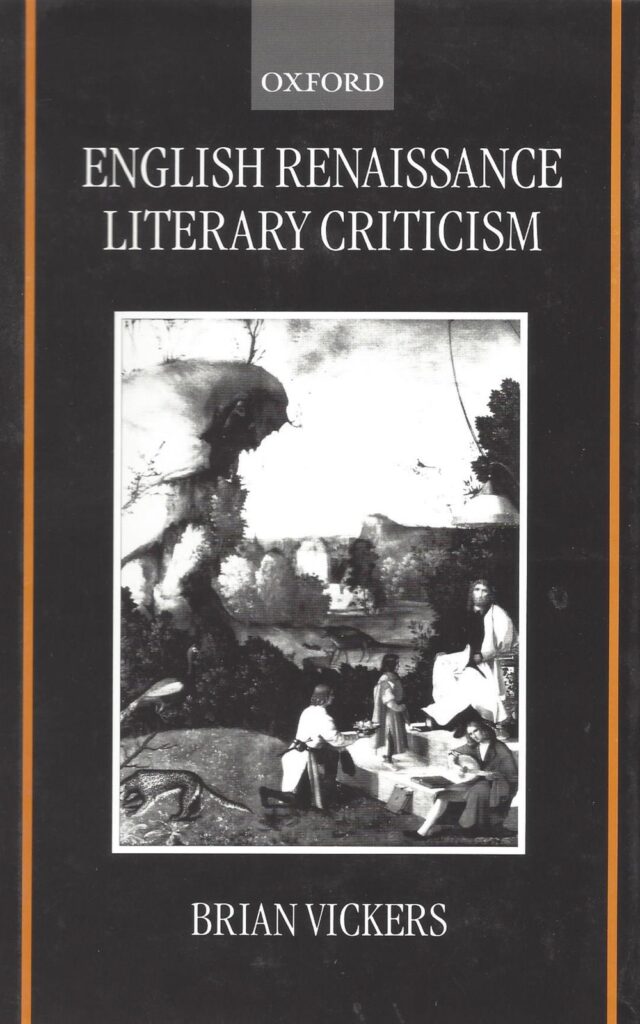 English Renaissance Literary Criticism (Oxford: Oxford University Press, 2000), Pp. xv, 675. ISBN: 978-0-19-818679-3
English Renaissance Literary Criticism (Oxford: Oxford University Press, 2000), Pp. xv, 675. ISBN: 978-0-19-818679-3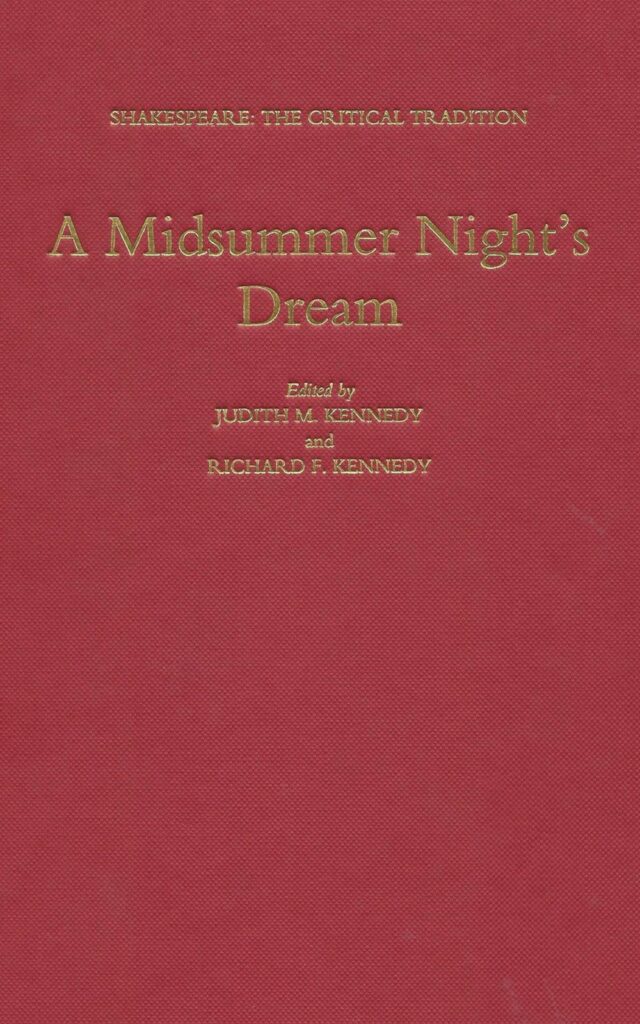 Shakespeare. The Critical Tradition. A Midsummer Night’s Dream, 1775–1920, ed. by Judith M. Kennedy and Richard F. Kennedy (London and NJ: Athlone Press, 1999), pp. xxi, 461. General Editor’s Preface, pp. x–xix.
Shakespeare. The Critical Tradition. A Midsummer Night’s Dream, 1775–1920, ed. by Judith M. Kennedy and Richard F. Kennedy (London and NJ: Athlone Press, 1999), pp. xxi, 461. General Editor’s Preface, pp. x–xix. Francis Bacon, The Essays and Counsels, Civil and Moral (The Folio Society, 2002).
Francis Bacon, The Essays and Counsels, Civil and Moral (The Folio Society, 2002).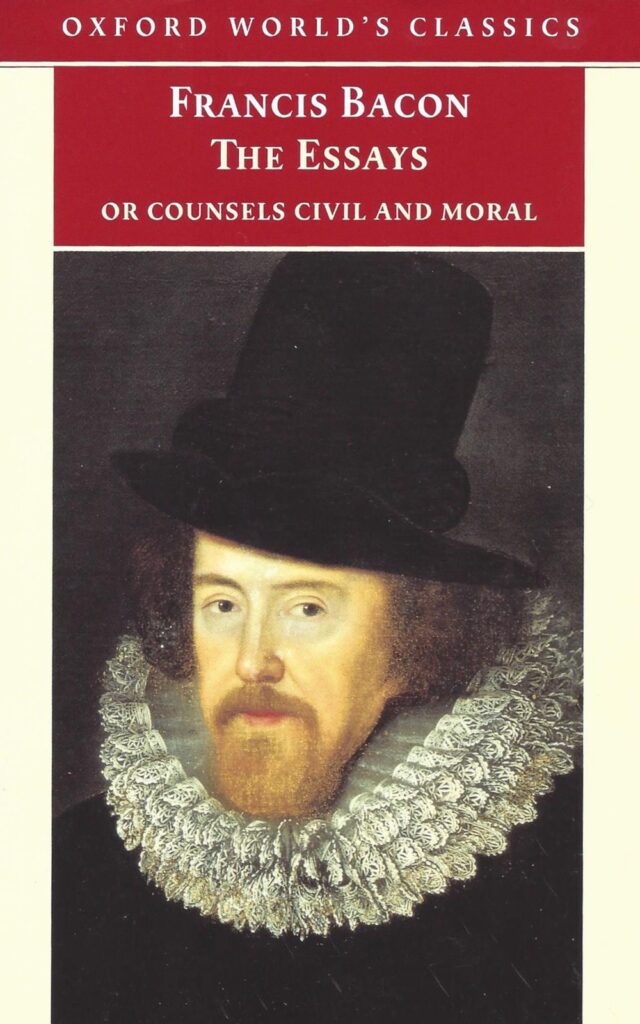 Francis Bacon, The Essays and Counsels, Civil and Moral (Oxford World’s Classics, 1999): pp. xliii, 216.
Francis Bacon, The Essays and Counsels, Civil and Moral (Oxford World’s Classics, 1999): pp. xliii, 216.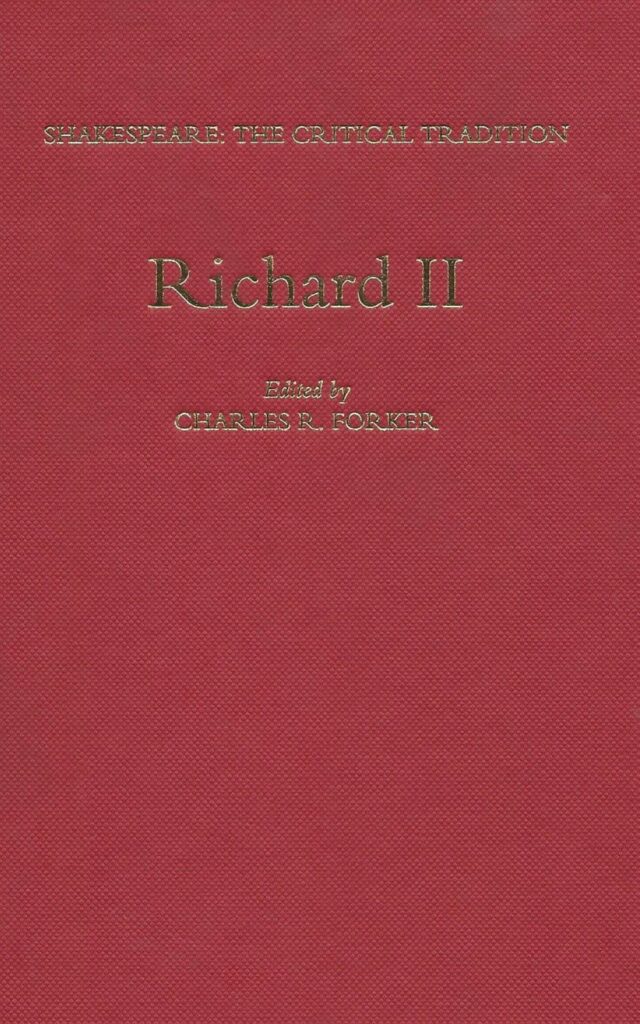 Shakespeare. The Critical Tradition. Richard II, 1780–1920, ed. by Charles Forker (London and NJ: Athlone Press), pp. xviii, 593. General Editor’s Preface, pp. x–xv.
Shakespeare. The Critical Tradition. Richard II, 1780–1920, ed. by Charles Forker (London and NJ: Athlone Press), pp. xviii, 593. General Editor’s Preface, pp. x–xv.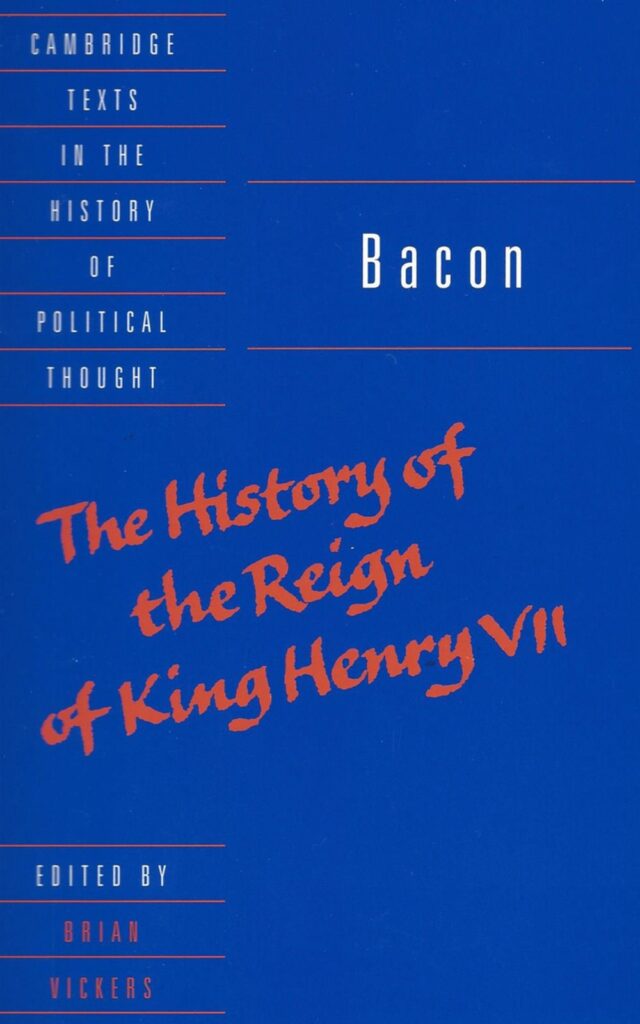 Francis Bacon, History of the Reign of King Henry VII (Cambridge: Cambridge University Press, 1998), pp. x, 281. (“Cambridge Texts in the History of Political Thought”).
Francis Bacon, History of the Reign of King Henry VII (Cambridge: Cambridge University Press, 1998), pp. x, 281. (“Cambridge Texts in the History of Political Thought”). Shakespeare. The Critical Tradition. King John, ed. by Joseph Candido (London and NJ: Athlone Press, 1996), pp. xvi, 415. General Editor’s Preface, pp. vi–ix.
Shakespeare. The Critical Tradition. King John, ed. by Joseph Candido (London and NJ: Athlone Press, 1996), pp. xvi, 415. General Editor’s Preface, pp. vi–ix. Francis Bacon (Oxford: Oxford University Press, 2008), pp. li, 813. (“Oxford World’s Classics”).
Francis Bacon (Oxford: Oxford University Press, 2008), pp. li, 813. (“Oxford World’s Classics”).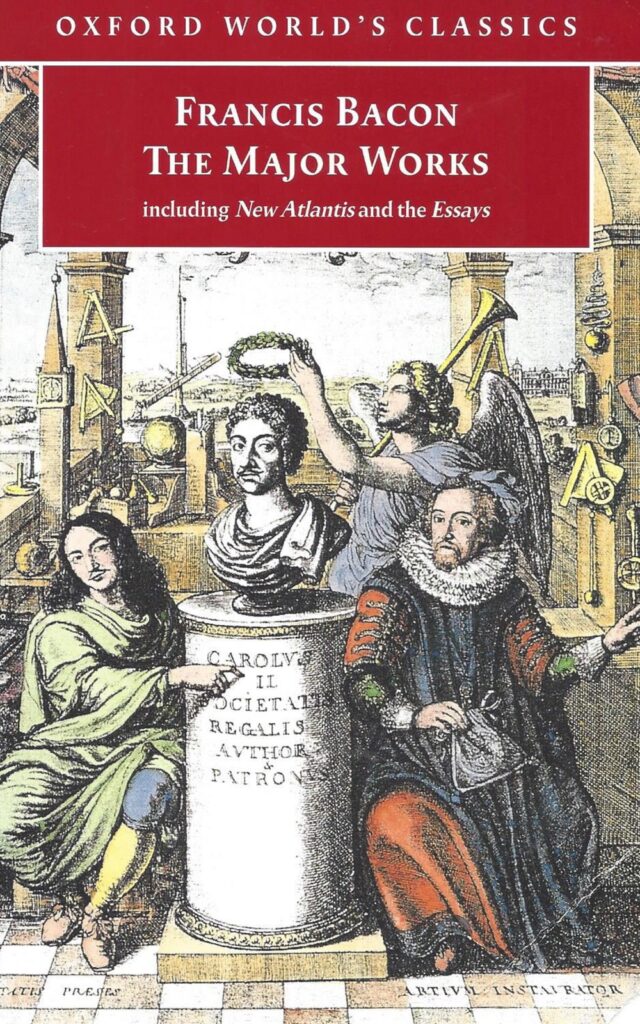 Francis Bacon (Oxford: Oxford University Press, 2002), pp. li, 813. (“The Oxford Authors”).
Francis Bacon (Oxford: Oxford University Press, 2002), pp. li, 813. (“The Oxford Authors”).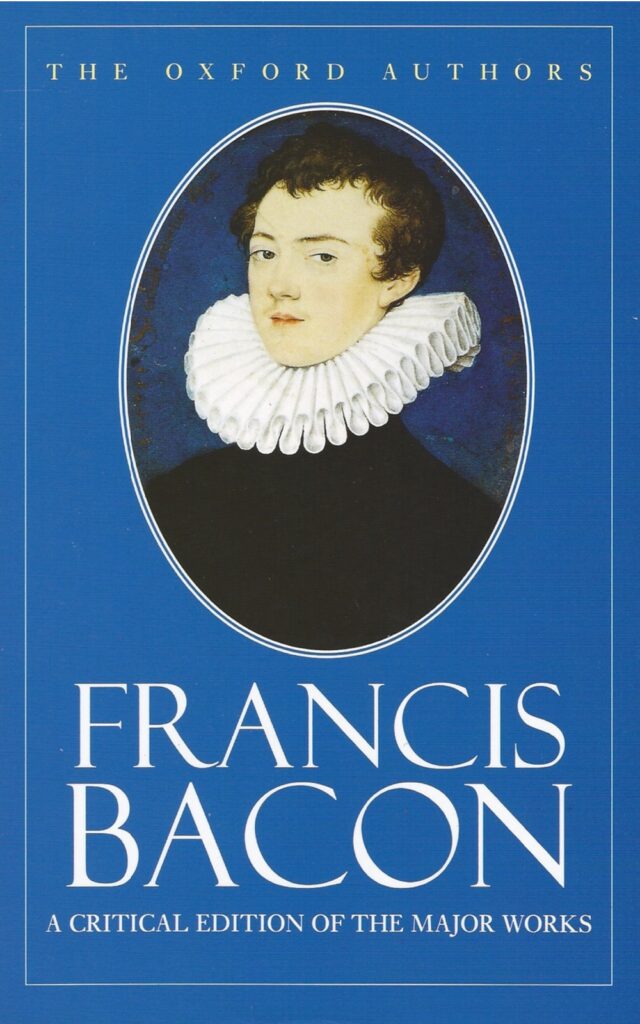 Francis Bacon (Oxford: Oxford University Press, 1996), pp. li, 813. (“The Oxford Authors”).
Francis Bacon (Oxford: Oxford University Press, 1996), pp. li, 813. (“The Oxford Authors”). Francis Bacon (Oxford: Oxford University Press, 1996), pp. li, 813.
Francis Bacon (Oxford: Oxford University Press, 1996), pp. li, 813. Ripensare Shakespeare. Questioni di critica contemporanea (Milan, 2001). Italian translation of B27 by Mario Baccianini, Marina Merella, and Alessandra Di Luzio.
Ripensare Shakespeare. Questioni di critica contemporanea (Milan, 2001). Italian translation of B27 by Mario Baccianini, Marina Merella, and Alessandra Di Luzio.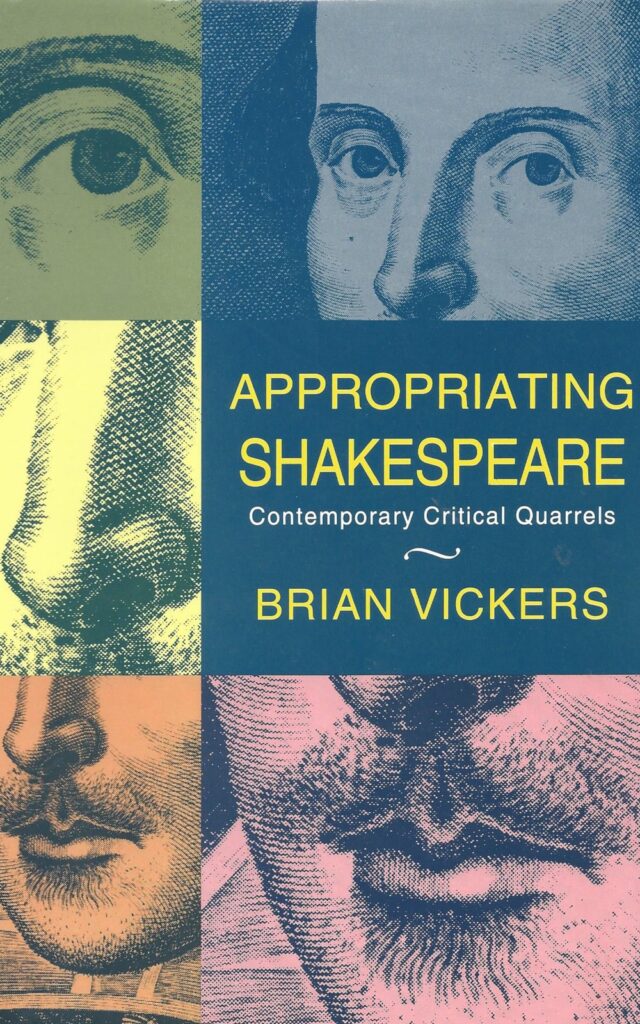 Appropriating Shakespeare: Contemporary Critical Quarrels (New Haven and London: Yale University Press, 1993), pp. xvi, 501. Paperback ed. 1994; repr. 1996.
Appropriating Shakespeare: Contemporary Critical Quarrels (New Haven and London: Yale University Press, 1993), pp. xvi, 501. Paperback ed. 1994; repr. 1996.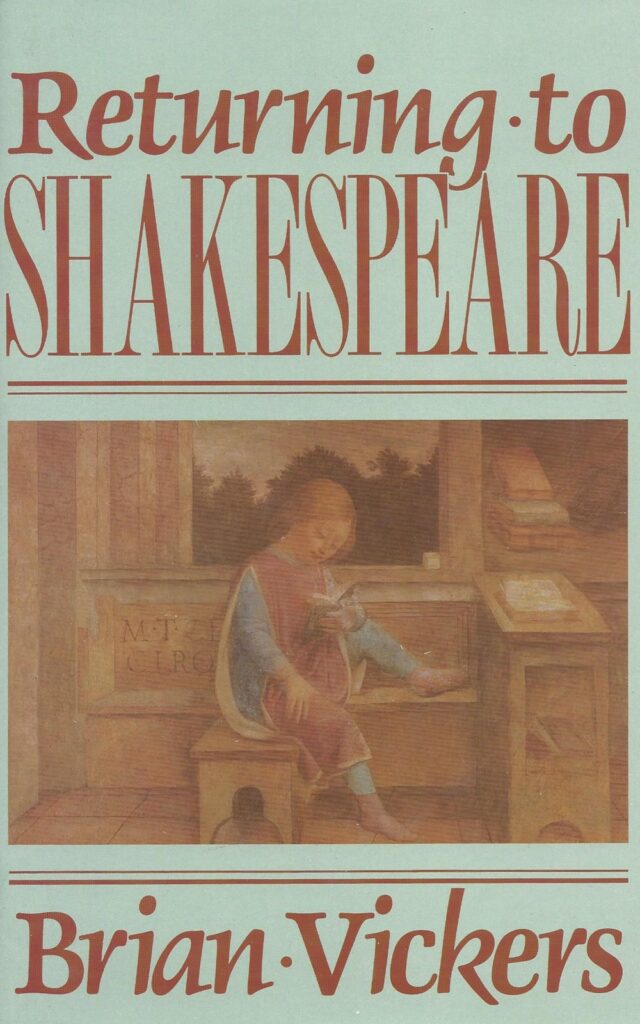 Returning to Shakespeare (London: Routledge, 1989), pp. viii, 257.
Returning to Shakespeare (London: Routledge, 1989), pp. viii, 257.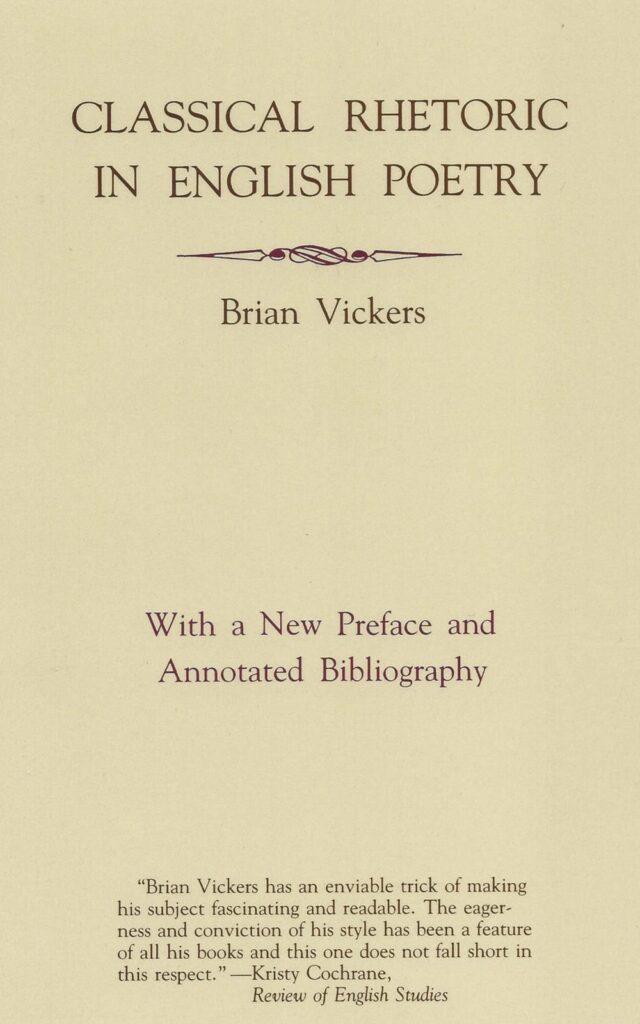 Classical Rhetoric in English Poetry; second ed., with new Preface and additional bibliography (Carbondale, Ill.: Southern Illinois University Press, 1989), pp. vii, 186.
Classical Rhetoric in English Poetry; second ed., with new Preface and additional bibliography (Carbondale, Ill.: Southern Illinois University Press, 1989), pp. vii, 186.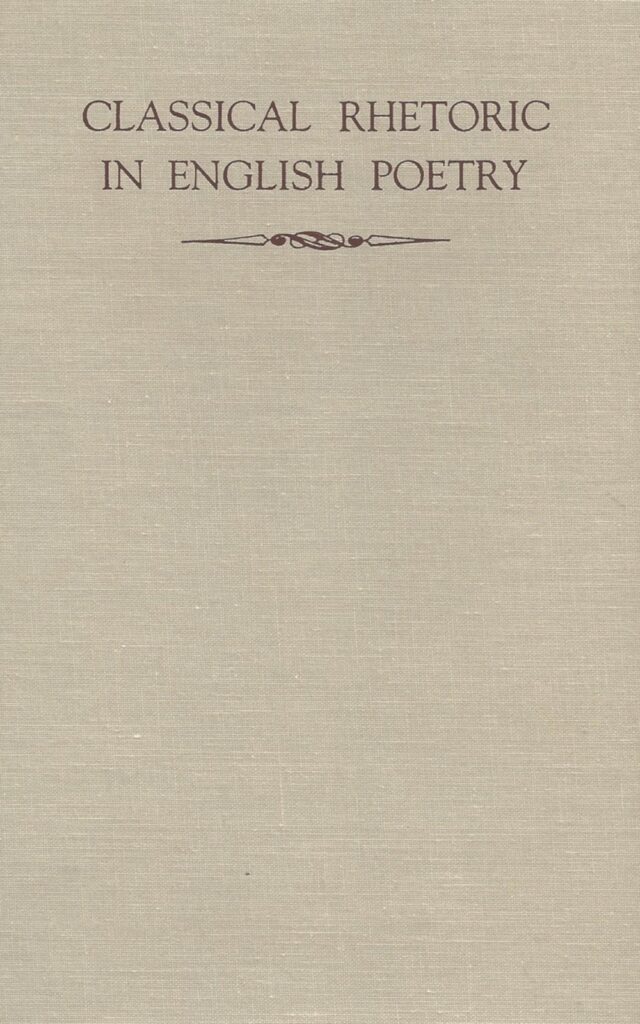 Classical Rhetoric in English Poetry; second ed., with new Preface and additional bibliography (Carbondale, Ill.: Southern Illinois University Press, 1989), pp. vii, 186.
Classical Rhetoric in English Poetry; second ed., with new Preface and additional bibliography (Carbondale, Ill.: Southern Illinois University Press, 1989), pp. vii, 186.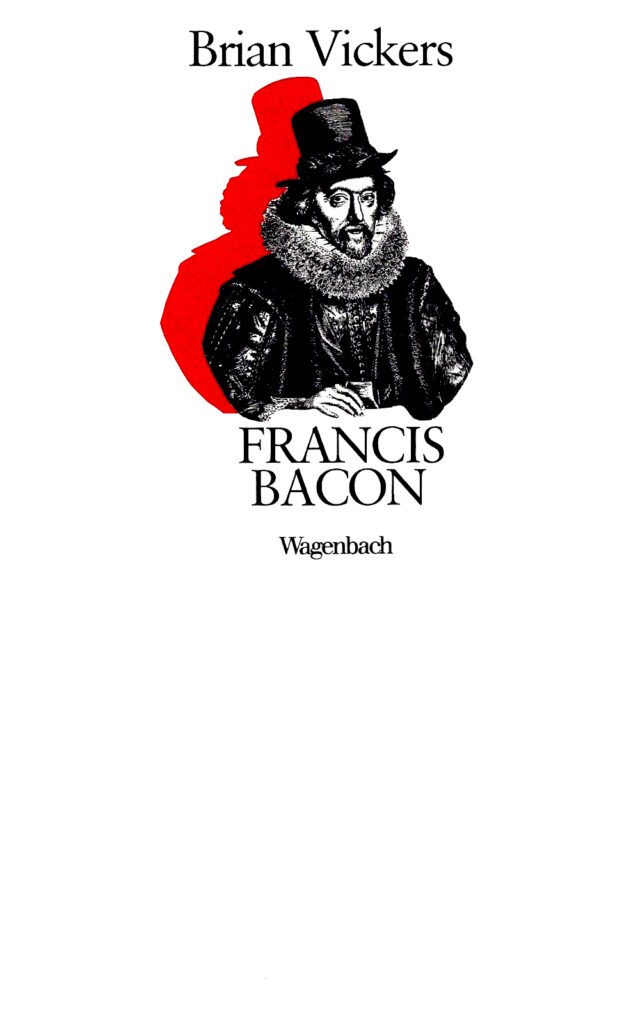 Francis Bacon, German translation of B15 and A30 by Reinhard Kaiser (Berlin: Wagenbach, 1988), pp. 78.
Francis Bacon, German translation of B15 and A30 by Reinhard Kaiser (Berlin: Wagenbach, 1988), pp. 78.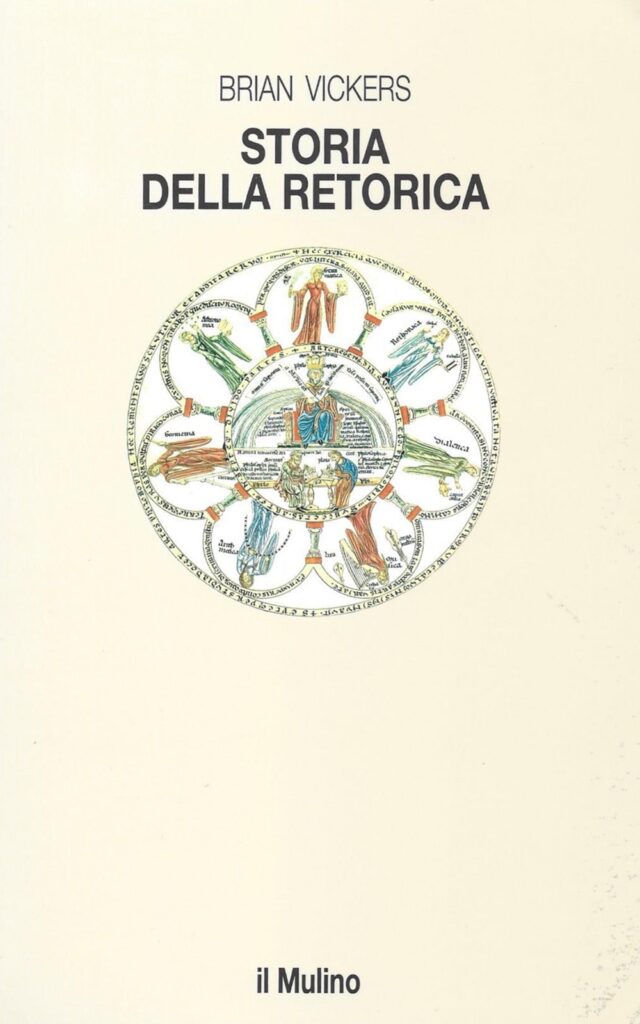 Storia della retorica (Bologna: il Mulino, 1994), pp. 649. Italian translation of B23 by Rocco Coronato; introduction by Andrea Battistini.
Storia della retorica (Bologna: il Mulino, 1994), pp. 649. Italian translation of B23 by Rocco Coronato; introduction by Andrea Battistini.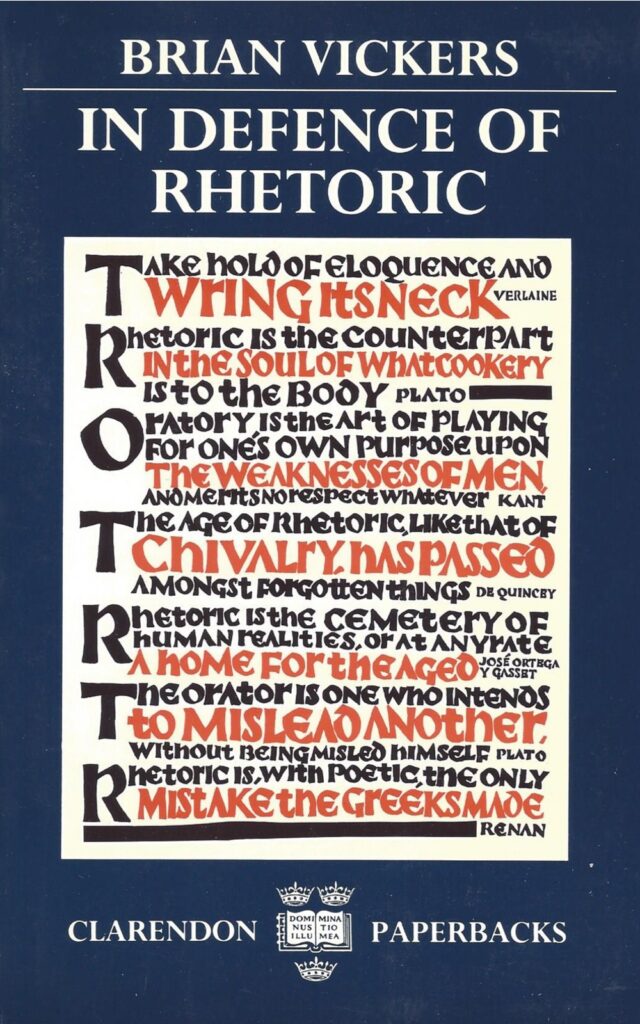 In Defence of Rhetoric (Oxford: Oxford University Press, 1988), pp. xi, 508.
In Defence of Rhetoric (Oxford: Oxford University Press, 1988), pp. xi, 508.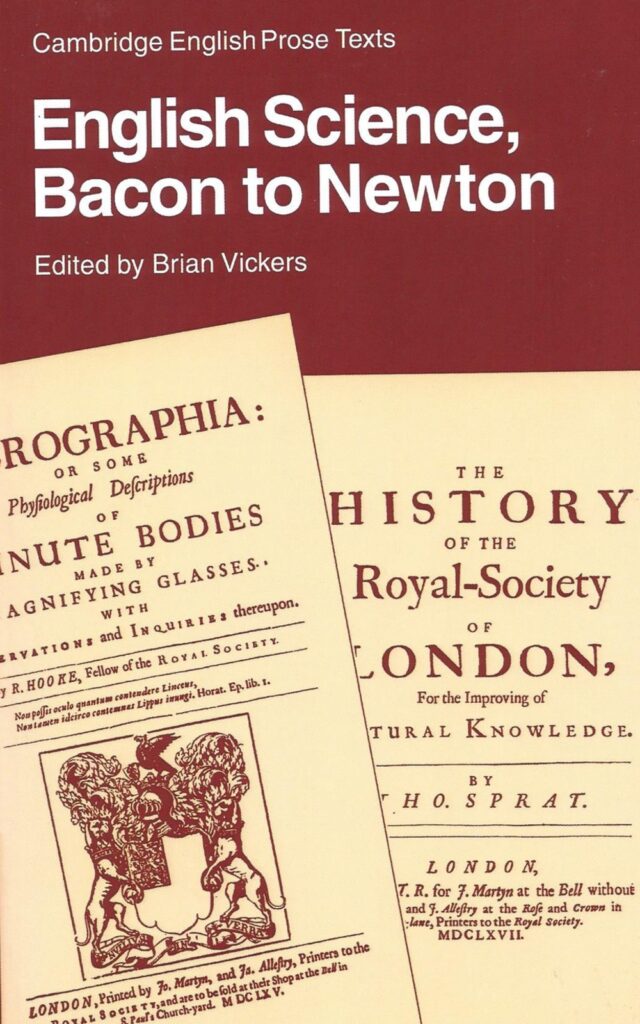 (Editor) English Science, Bacon to Newton (Cambridge: Cambridge University Press, 1987), pp. xi, 244.
(Editor) English Science, Bacon to Newton (Cambridge: Cambridge University Press, 1987), pp. xi, 244.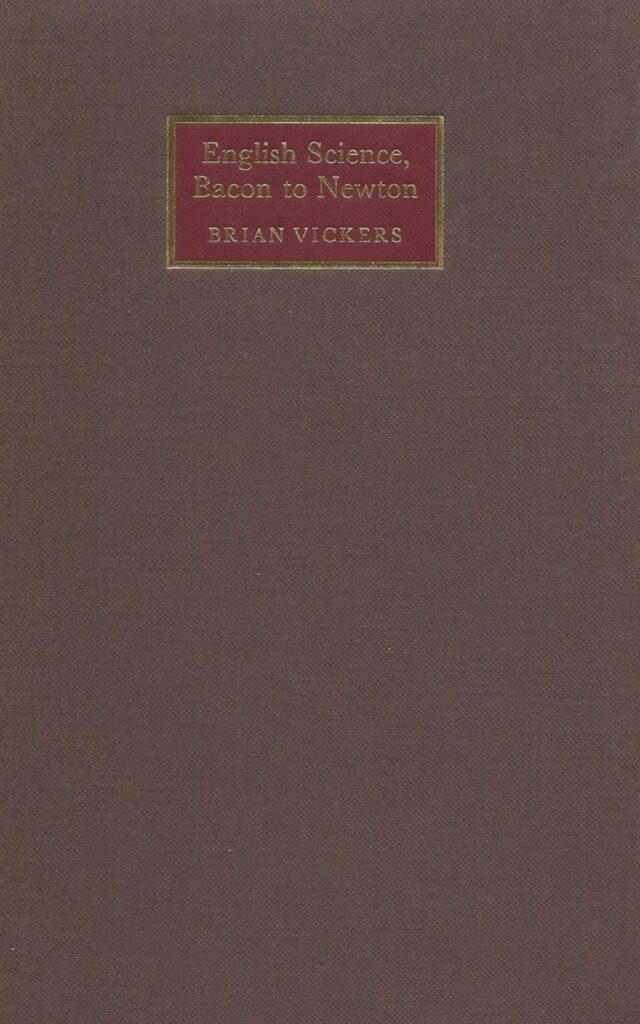 (Editor) English Science, Bacon to Newton (Cambridge: Cambridge University Press, 1987), pp. xi, 244.
(Editor) English Science, Bacon to Newton (Cambridge: Cambridge University Press, 1987), pp. xi, 244.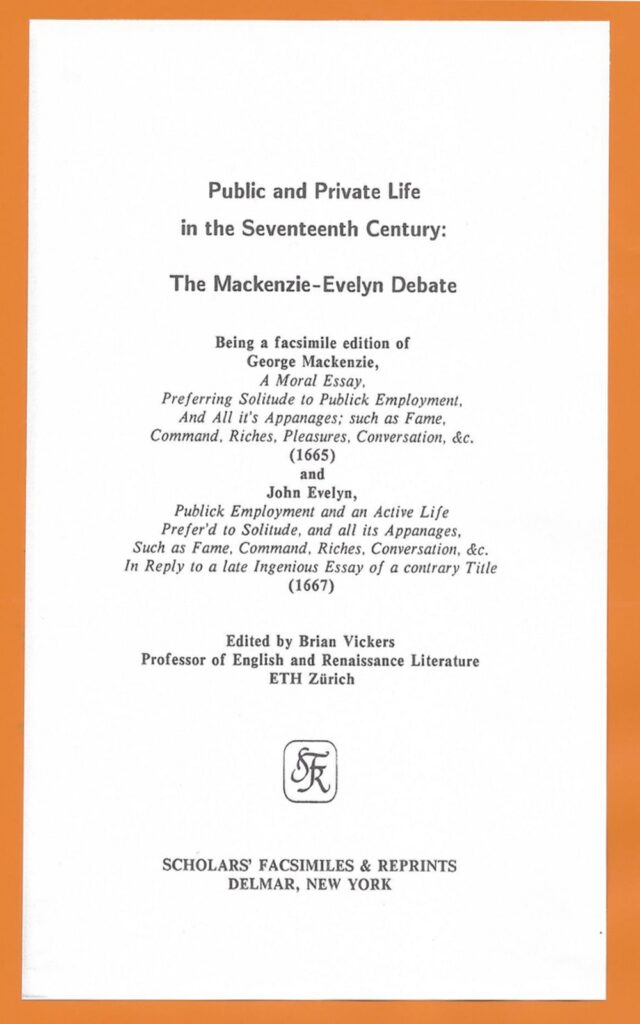 (Editor) Public and Private Life in the Seventeenth Century: The Mackenzie-Evelyn Debate (Delmar, NY: Scholars’ Facsimiles and Reprints, 1986), pp. xlii, 277. – Introduction, pp. ix–xlii.
(Editor) Public and Private Life in the Seventeenth Century: The Mackenzie-Evelyn Debate (Delmar, NY: Scholars’ Facsimiles and Reprints, 1986), pp. xlii, 277. – Introduction, pp. ix–xlii.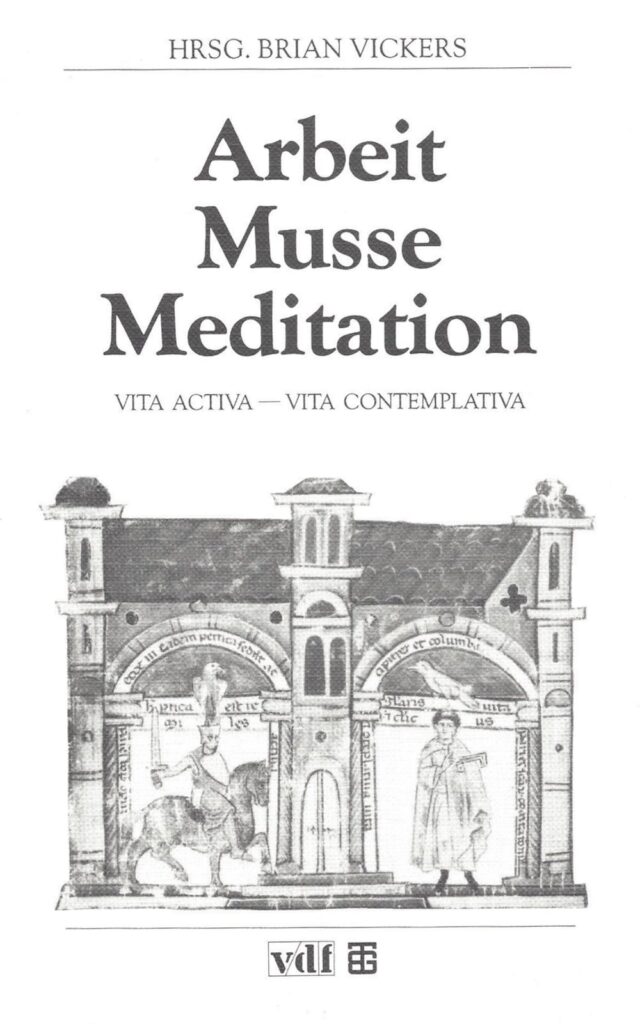 (Editor) Arbeit, Musse, Meditation. Betrachtungen zur Vita activa und Vita contemplativa (Zurich: Verlag der Fachvereine, 1985), pp. 307. – Introduction, pp. 1–19.
(Editor) Arbeit, Musse, Meditation. Betrachtungen zur Vita activa und Vita contemplativa (Zurich: Verlag der Fachvereine, 1985), pp. 307. – Introduction, pp. 1–19.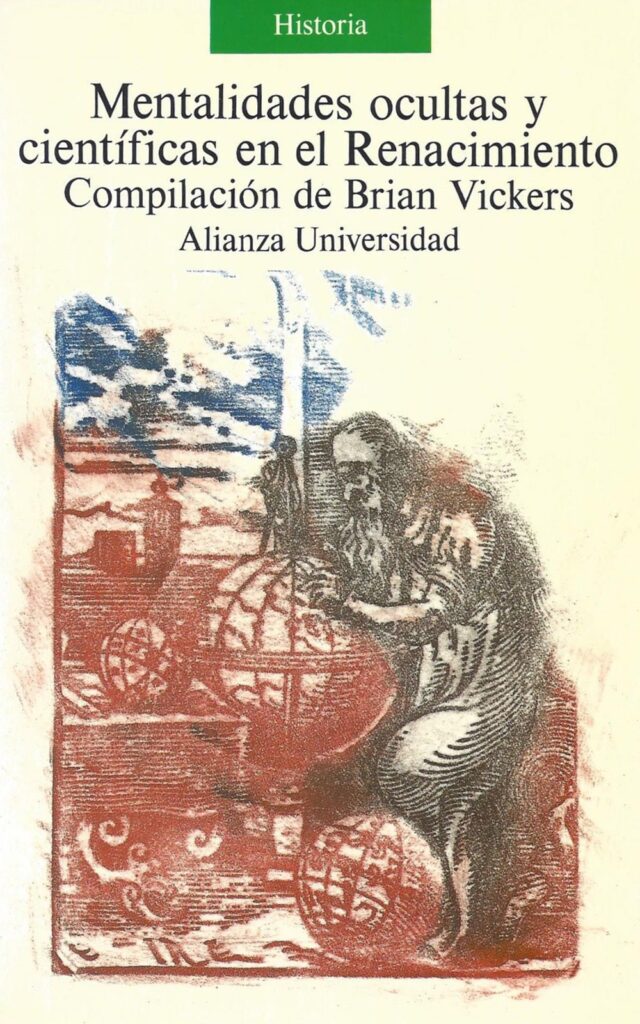 (Editor) Mentalidades ocultas y científicas en el Renacimento (Madrid: Alianza Editorial, 1990), pp. 318. Abridged Spanish translation of B19 by Jorge Vigil Rubio.
(Editor) Mentalidades ocultas y científicas en el Renacimento (Madrid: Alianza Editorial, 1990), pp. 318. Abridged Spanish translation of B19 by Jorge Vigil Rubio. (Editor) Occult and Scientific Mentalities in the Renaissance (Cambridge: Cambridge University Press, 1984), pp. xiv., 408. – Introduction, pp. 1–55.
(Editor) Occult and Scientific Mentalities in the Renaissance (Cambridge: Cambridge University Press, 1984), pp. xiv., 408. – Introduction, pp. 1–55.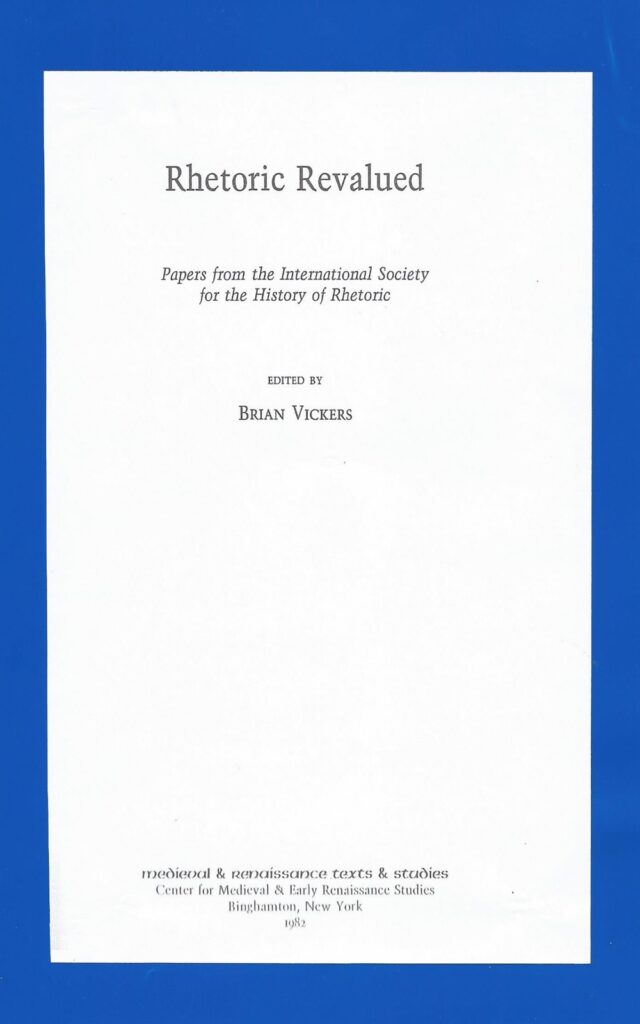 (Editor) Rhetoric Revalued. Papers from the International Society for the History of Rhetoric (Binghamton, NY: Medieval and Renaissance Texts and Studies, 1981), pp. 281. – Introduction, pp. 13–39.
(Editor) Rhetoric Revalued. Papers from the International Society for the History of Rhetoric (Binghamton, NY: Medieval and Renaissance Texts and Studies, 1981), pp. 281. – Introduction, pp. 13–39.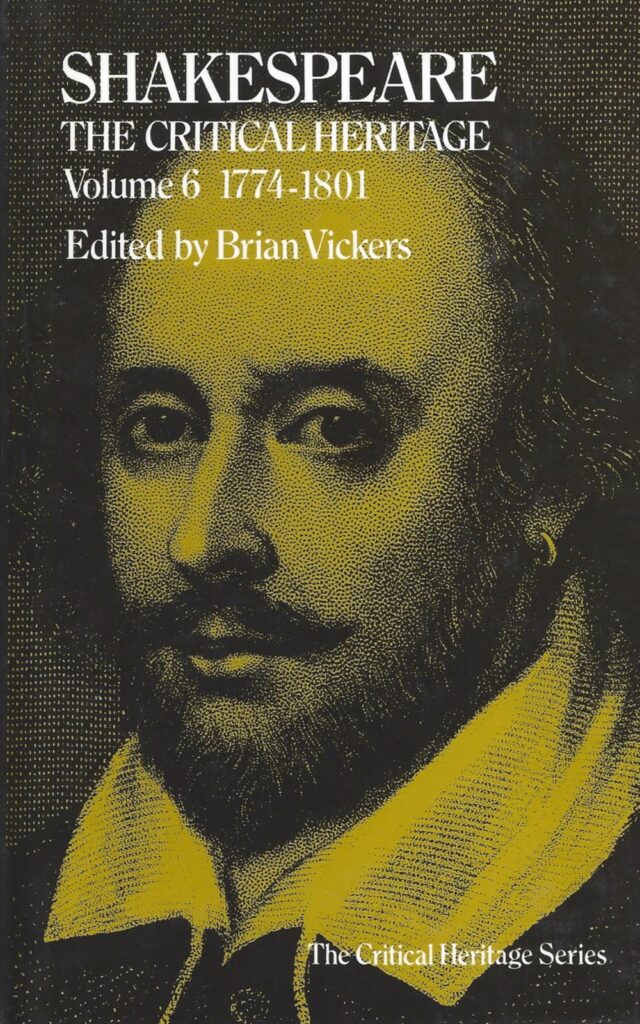 (Editor) Shakespeare: The Critical Heritage. Volume 6. 1774–1801 (London and Boston: Routledge & Kegan Paul, 1981), pp. 650.
(Editor) Shakespeare: The Critical Heritage. Volume 6. 1774–1801 (London and Boston: Routledge & Kegan Paul, 1981), pp. 650. (Editor) Shakespeare: The Critical Heritage. Volume 5. 1765–1774 (London and Boston: Routledge & Kegan Paul, 1979), pp. xvi, 569.
(Editor) Shakespeare: The Critical Heritage. Volume 5. 1765–1774 (London and Boston: Routledge & Kegan Paul, 1979), pp. xvi, 569.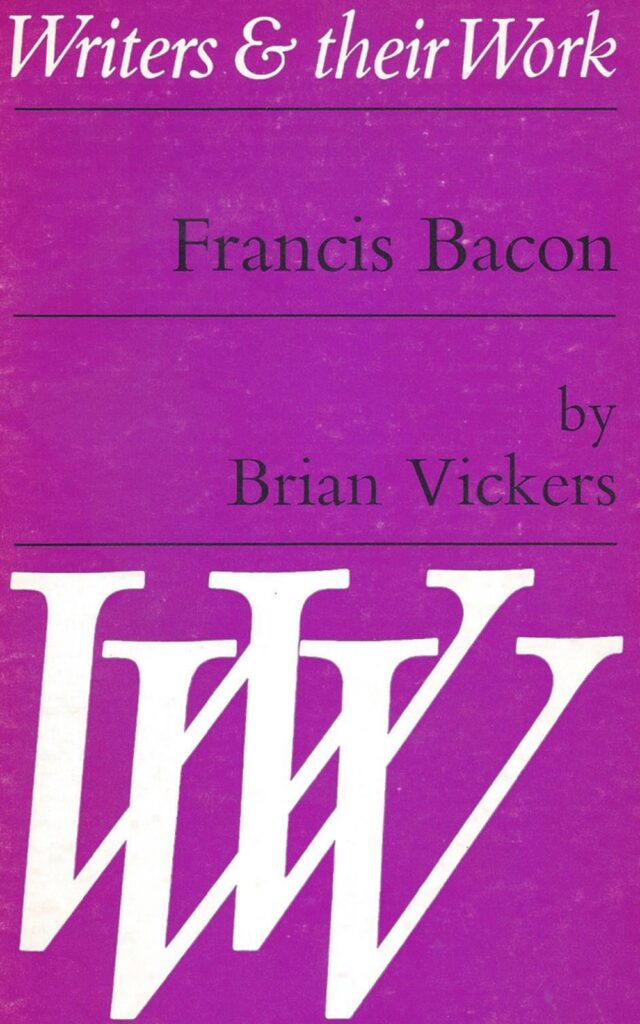 Francis Bacon (London: Longman, 1978), pp. 46; repr. in British Writers ed. I. Scott-Kilvert, Vol. 1 (New York: Scribner’s, 1979), pp. 257–74.
Francis Bacon (London: Longman, 1978), pp. 46; repr. in British Writers ed. I. Scott-Kilvert, Vol. 1 (New York: Scribner’s, 1979), pp. 257–74. Shakespeare’s Coriolanus (London: Edward Arnold, 1976), pp. 68. (“Studies in English Literature” series).
Shakespeare’s Coriolanus (London: Edward Arnold, 1976), pp. 68. (“Studies in English Literature” series).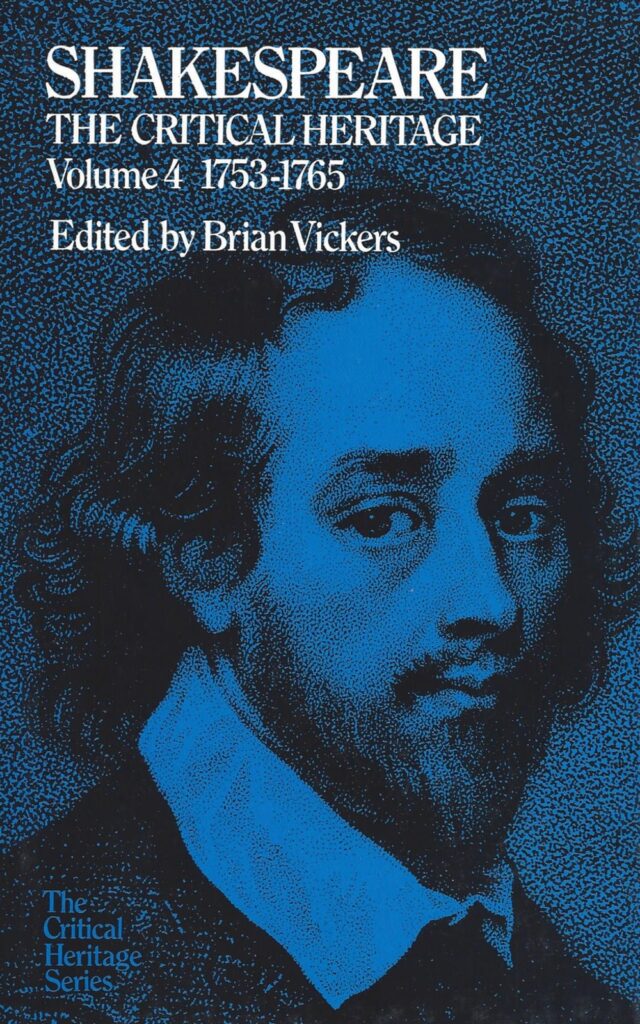 (Editor) Shakespeare: The Critical Heritage. Volume 4. 1753–1765 (London and Boston: Routledge & Kegan Paul, 1976), pp. xiv, 583.
(Editor) Shakespeare: The Critical Heritage. Volume 4. 1753–1765 (London and Boston: Routledge & Kegan Paul, 1976), pp. xiv, 583.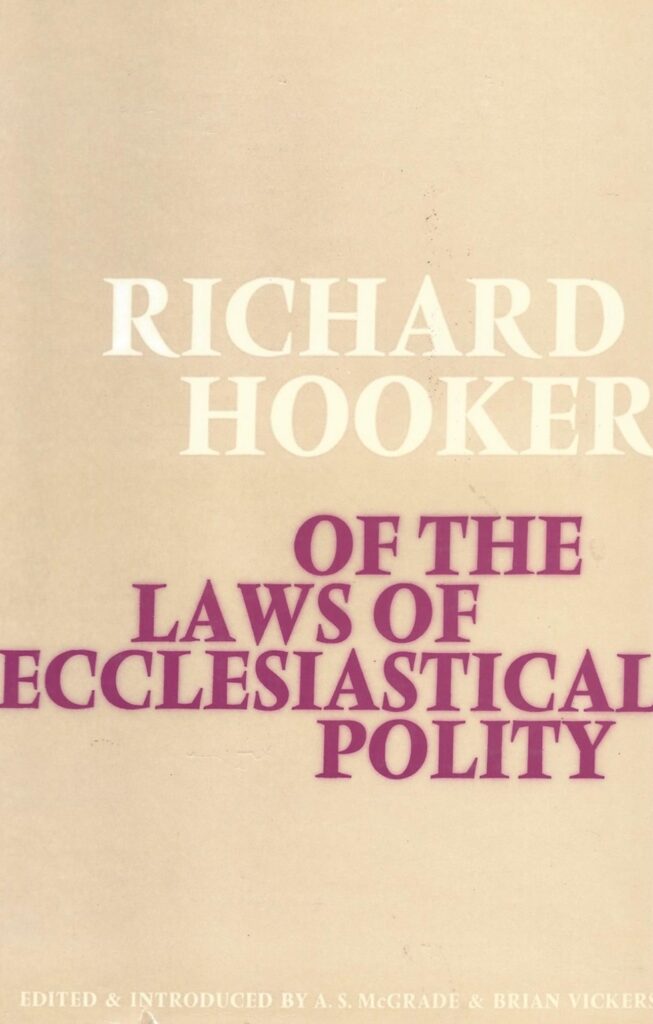 (Editor) Hooker: The Laws of Ecclesiastical Polity. An Abridged Edition. Co-editor: A.S. McGrade (London: Sidgwick & Jackson, 1976), pp. 413. Introduction 2: “Hooker’s Prose Style”, pp. 41–59.
(Editor) Hooker: The Laws of Ecclesiastical Polity. An Abridged Edition. Co-editor: A.S. McGrade (London: Sidgwick & Jackson, 1976), pp. 413. Introduction 2: “Hooker’s Prose Style”, pp. 41–59. (Editor) Shakespeare: The Critical Heritage. Volume 3. 1733–1752 (London and Boston: Routledge & Kegan Paul, 1975), pp. xii, 487.
(Editor) Shakespeare: The Critical Heritage. Volume 3. 1733–1752 (London and Boston: Routledge & Kegan Paul, 1975), pp. xii, 487.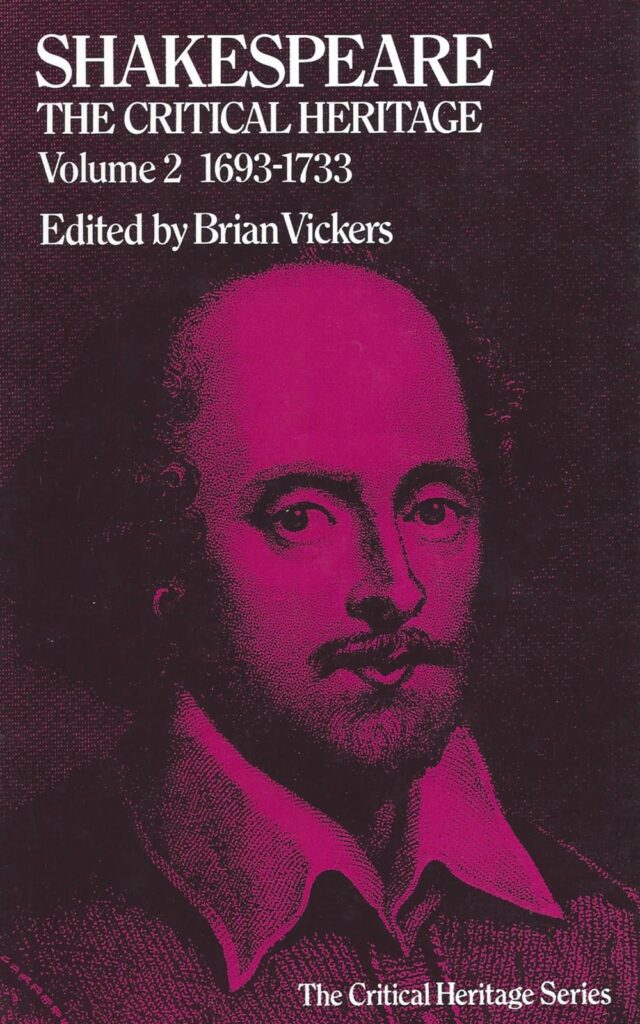 (Editor) Shakespeare: The Critical Heritage. Volume 2. 1693–1733 (London and Boston: Routledge & Kegan Paul, 1974), pp. xi, 549.
(Editor) Shakespeare: The Critical Heritage. Volume 2. 1693–1733 (London and Boston: Routledge & Kegan Paul, 1974), pp. xi, 549.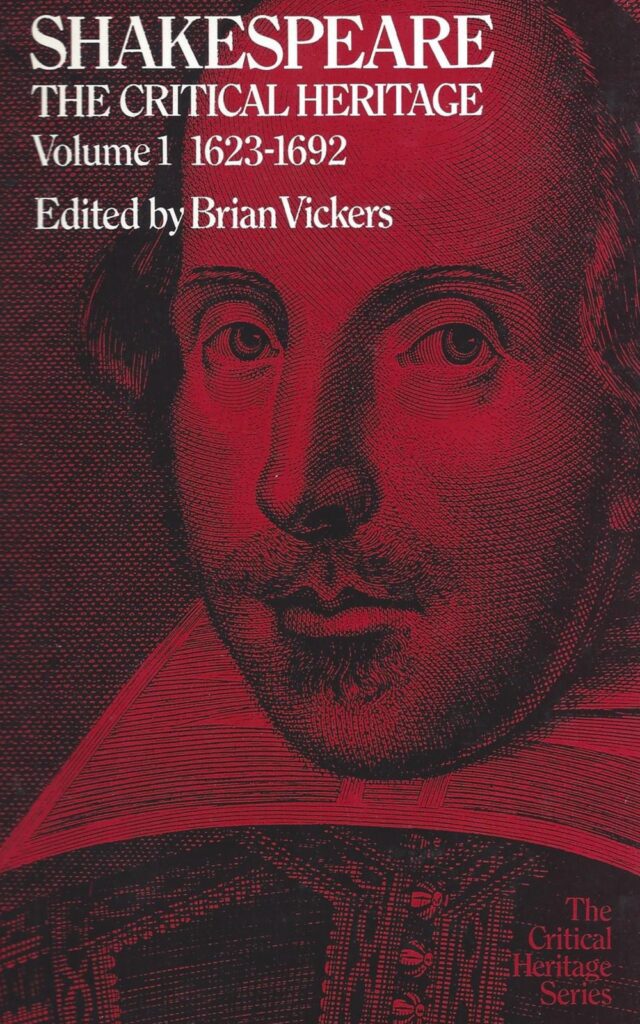 (Editor) Shakespeare: The Critical Heritage. Volume 1. 1623–1692 (London and Boston: Routledge & Kegan Paul, 1974), pp. xi, 448.
(Editor) Shakespeare: The Critical Heritage. Volume 1. 1623–1692 (London and Boston: Routledge & Kegan Paul, 1974), pp. xi, 448.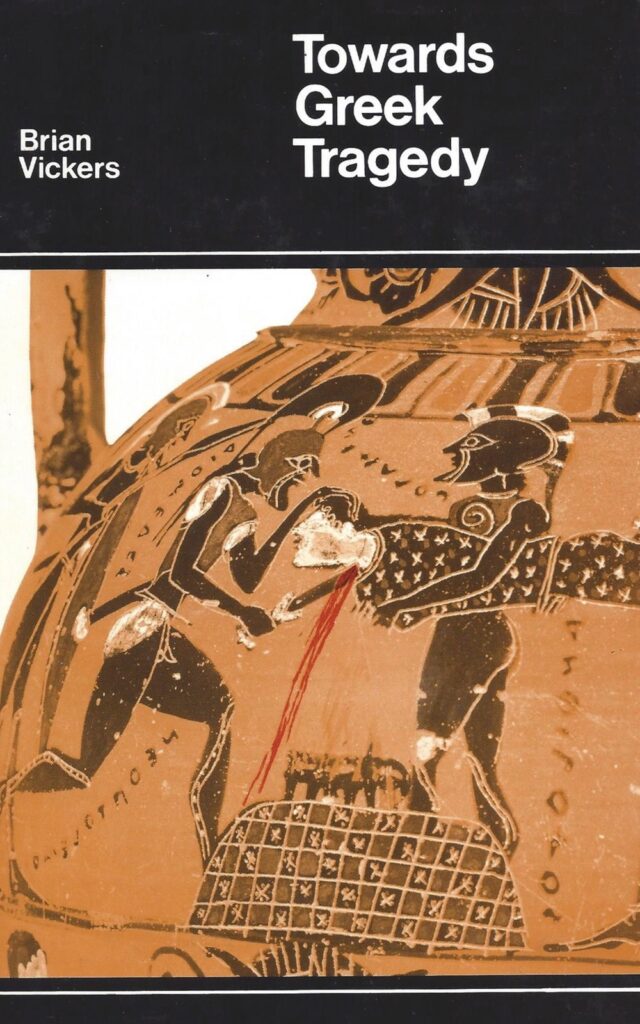 Towards Greek Tragedy (London: Longman, 1973), pp. xvi, 658; repr. 1979.
Towards Greek Tragedy (London: Longman, 1973), pp. xvi, 658; repr. 1979. Classical Rhetoric in English Poetry (London: Macmillan, 1970), pp. 180.
Classical Rhetoric in English Poetry (London: Macmillan, 1970), pp. 180.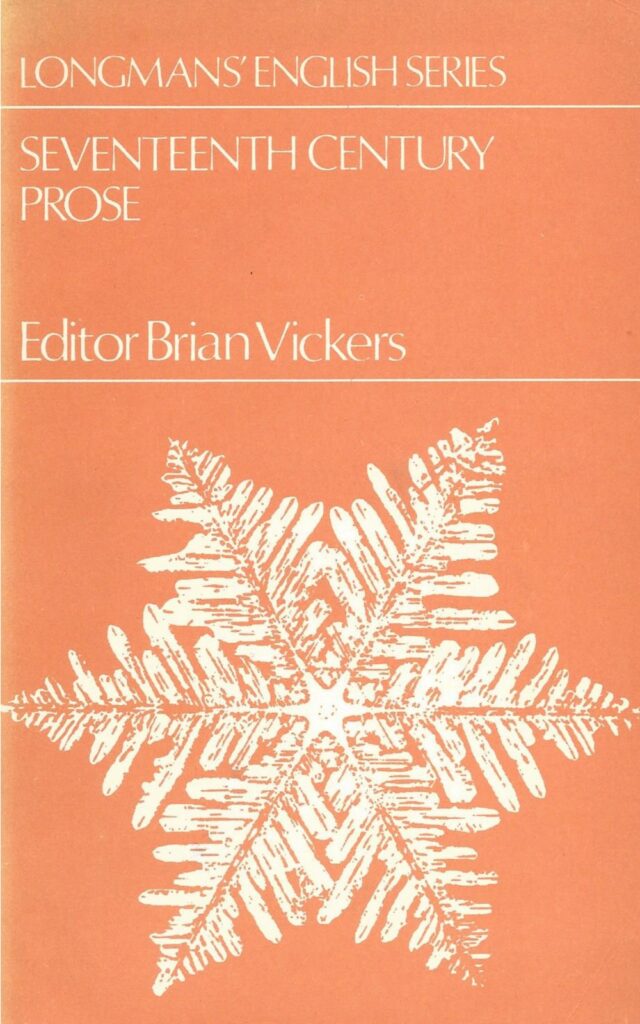 (Editor) Seventeenth Century Prose: An Anthology (London: Longman, 1969), pp. 266.
(Editor) Seventeenth Century Prose: An Anthology (London: Longman, 1969), pp. 266.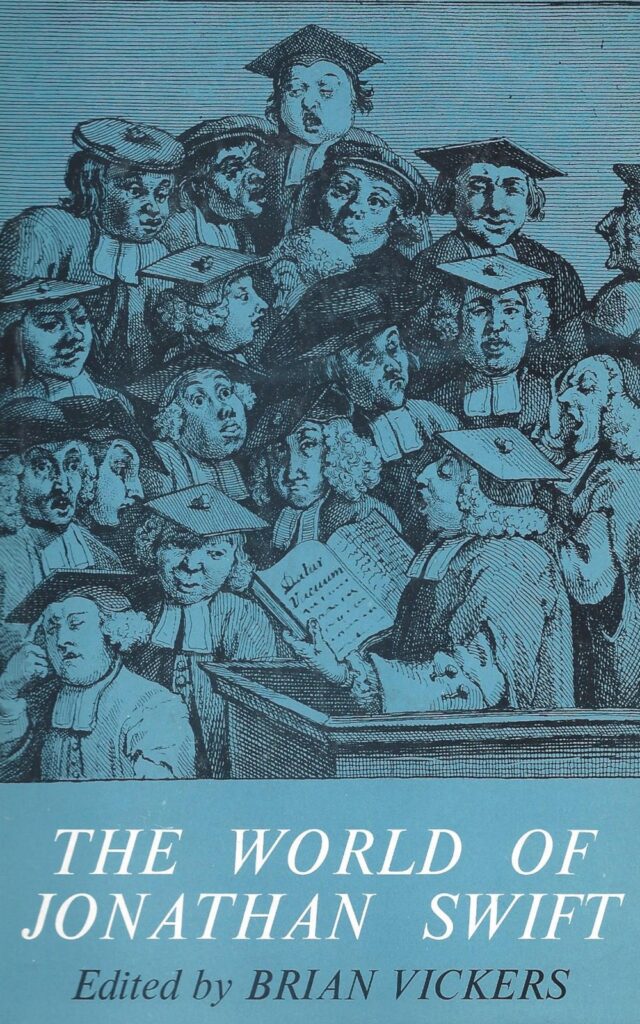 (Editor) The World of Jonathan Swift (Oxford: Blackwell; Cambridge, MA: Harvard University Press, 1968), pp. ix, 273. – Introduction, pp. 1–24.
(Editor) The World of Jonathan Swift (Oxford: Blackwell; Cambridge, MA: Harvard University Press, 1968), pp. ix, 273. – Introduction, pp. 1–24.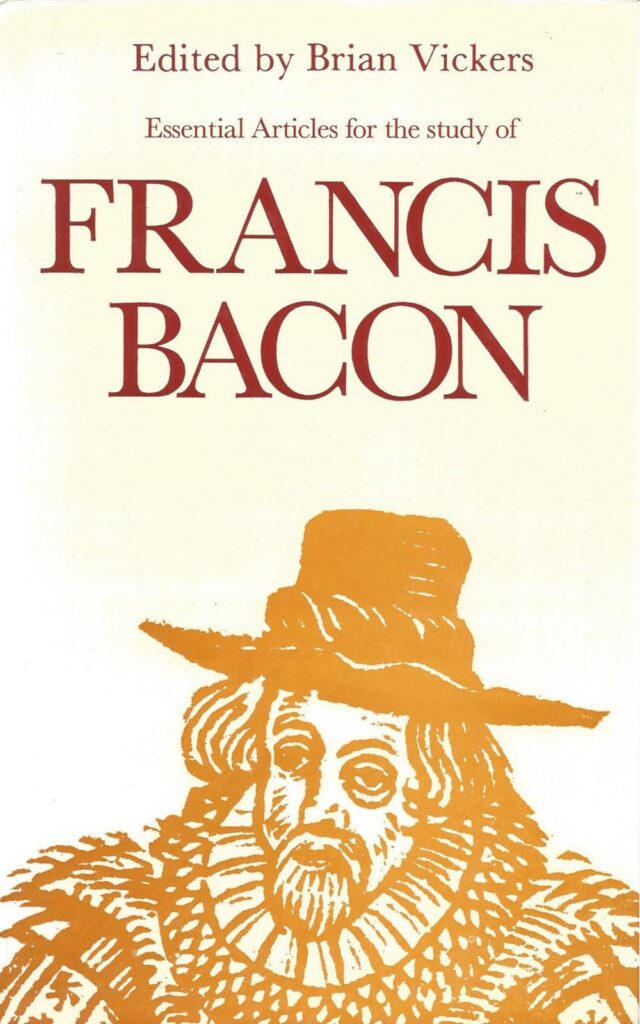 (Editor) Essential Articles for the Study of Francis Bacon (London: Sidgwick & Jackson, 1972), pp. xxiii, 323. – Introduction, pp. xi–xxiii.
(Editor) Essential Articles for the Study of Francis Bacon (London: Sidgwick & Jackson, 1972), pp. xxiii, 323. – Introduction, pp. xi–xxiii.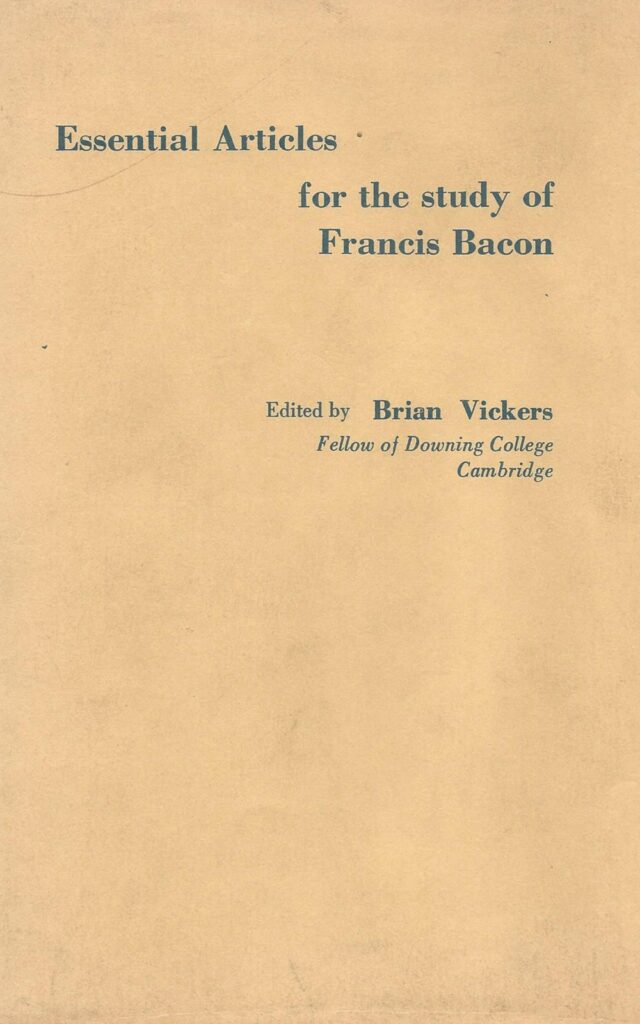 (Editor) Essential Articles for the Study of Francis Bacon (Hamden, CT: Archon Press, 1968), pp. xxiii, 323. English publication by Sidgwick & Jackson (London, 1972). – Introduction, pp. xi–xxiii.
(Editor) Essential Articles for the Study of Francis Bacon (Hamden, CT: Archon Press, 1968), pp. xxiii, 323. English publication by Sidgwick & Jackson (London, 1972). – Introduction, pp. xi–xxiii.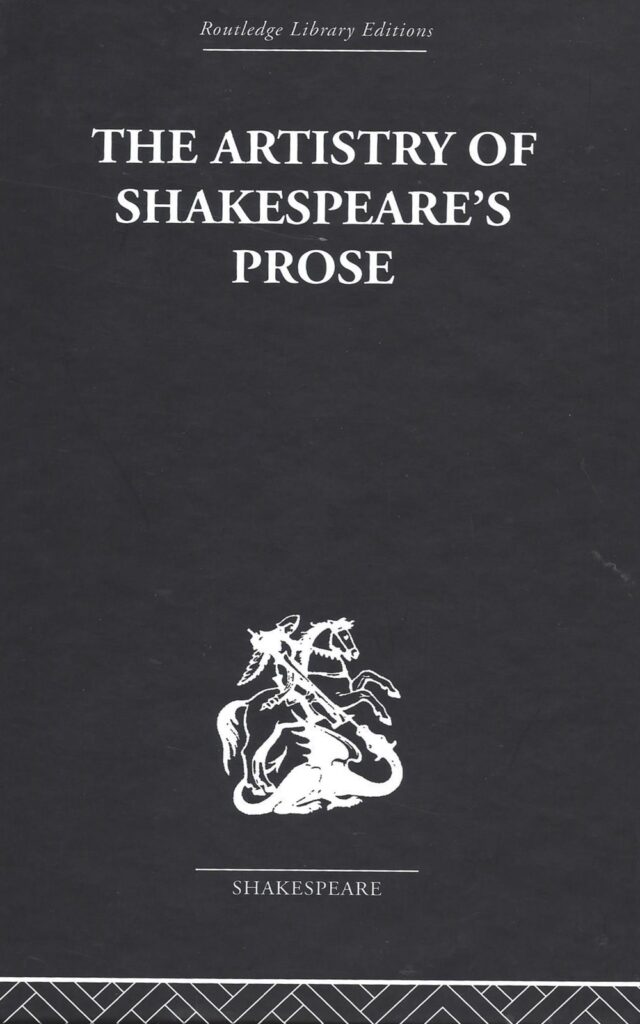 The Artistry of Shakespeare’s Prose, Third Edition (London: Routledge, 2005), pp. vii, 452.
The Artistry of Shakespeare’s Prose, Third Edition (London: Routledge, 2005), pp. vii, 452.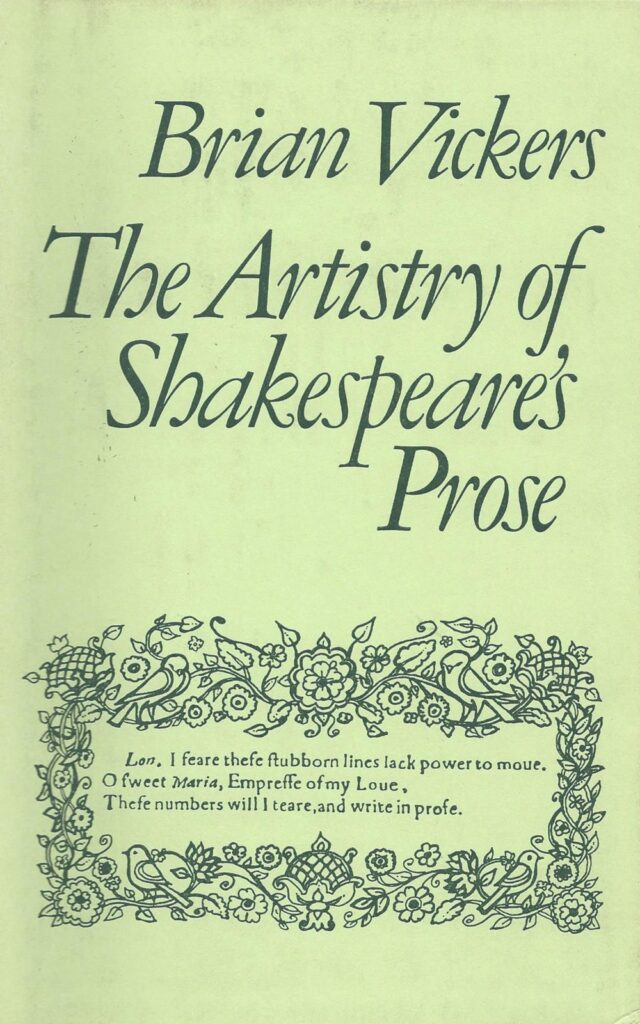 The Artistry of Shakespeare’s Prose, Revised Edition (London: Methuen, 1979), pp. x, 452.
The Artistry of Shakespeare’s Prose, Revised Edition (London: Methuen, 1979), pp. x, 452. The Artistry of Shakespeare’s Prose (London: Methuen, 1968), pp. ix, 452.
The Artistry of Shakespeare’s Prose (London: Methuen, 1968), pp. ix, 452.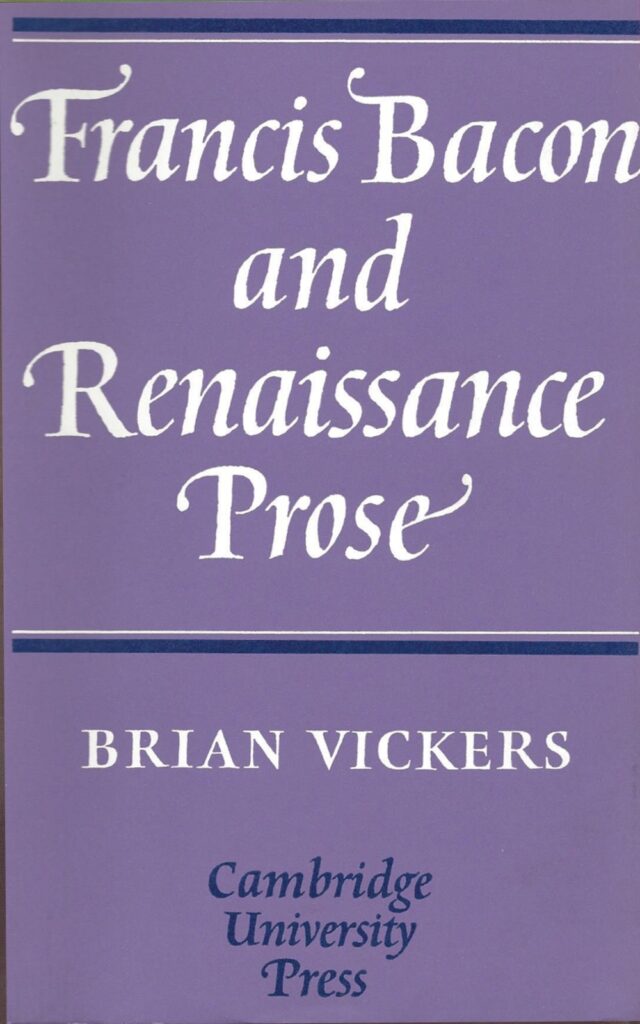 Francis Bacon and Renaissance Prose (Cambridge: Cambridge University Press, 1968), pp. xi, 316.
Francis Bacon and Renaissance Prose (Cambridge: Cambridge University Press, 1968), pp. xi, 316.